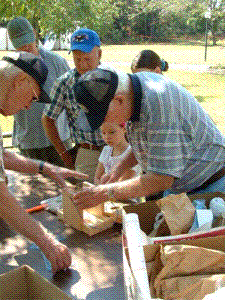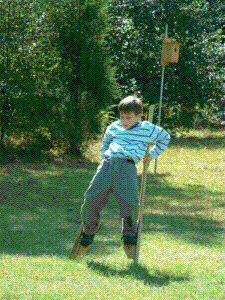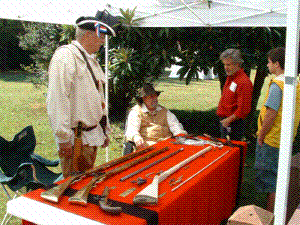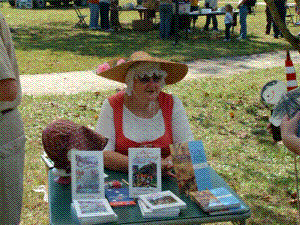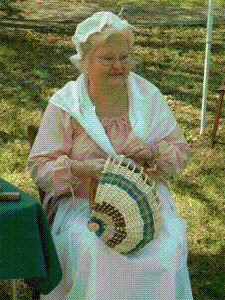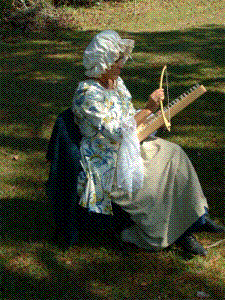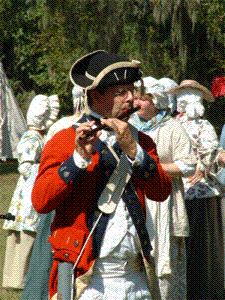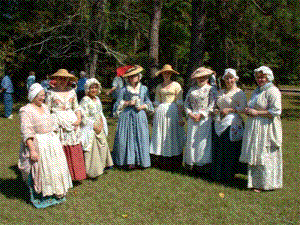"The best birding center in South Carolina and the Southeast."
Santee NW Refuge 2125 Fort Watson Rd. Summerton, SC 29148
803-478-2217 West of I-95, exit 102 @ US 301/US 15, 6 miles south of Summerton, SC
Events are held often and these are some past events.
Here's some history of activities of the Friends of Santee Refuge:
Santee National Wildlife Refuge, other locations and Santee: 803-478-2217
http://www.fws.gov/santee/bird_fest.html
The Santee Birding and Nature Festival is now accepting registration!
This year, the festival registration will be handled electronically and can be accessed through the following website...
http://www.fws.gov/santee/bird_fest.html
Please join us the weekend of April 29th - May 1st, 2011 as we celebrate and explore the many natural areas in central South Carolina!
Field Trip Itinerary
Friday April 29th
Audubon Center at Francis Beidler Forest: 6:15 am – 11:00 am Cost: $7/person
Hickory Top Waterfowl Management Area: 6:30 am – 12:00 pm Cost: FREE
Birding the Bluff Unit – Santee NWR: 7:00 am – 12:00 pm Cost: FREE
Fisheagle Swamp/Lake Tour: 1:00 pm – 3:30 pm Cost: $26/person
Plantation Island (Nelson’s Cut) Canoe/Kayak Trip: 1:30 pm – 5:00 pm Cost: FREE
Banquet and Keynote Speaker Patrick McMillan: 7:00 pm – 9:00 pm Cost: $25/person
Saturday April 30th
Manchester State Forest: 5:30 am – 12:00 pm Cost: FREE
Audubon Center at Beidler Forest w/ Patrick McMillan: 6:15 am – 11:00 am Cost: $7/person
Brosnan Forest: 6:15 am – 11:00 am Cost: FREE
Cuddo Unit – Santee NWR: 7:00 am – 12:00 pm Cost: FREE
Sparkleberry Swamp Canoe/Kayak Trip: 8:00 am – 12:00 pm Cost: $20/person
Butterfly Walk at Albermarle Corporation: 9:00 am – 1:00 pm Cost: FREE
Commemorative Battle at Fort Watson: 10:00 am – 10:45 Cost: FREE
Leaf Casting w/ the “Leaf Ladies”: 10:00 am – 12:00 pm Cost: $30/person
SSSSSSnakes! – Santee State Park: 1:00 pm – 3:00 pm Cost: FREE
Birds, Butterflies, and More!! – Santee NWR: 1:30 pm – 5:00 pm Cost: FREE
Sparkleberry Swamp Canoe/Kayak Trip: 1:30 am – 5:00 pm Cost: $20/person
Leaf Casting w/ the “Leaf Ladies”: 2:00 pm – 4:00 pm Cost: $30/person
Secret Life of Ponds – Santee State Park: 3:00 pm – 4:30 pm Cost: FREE
Festival Social/Birding Countdown: 6:30 pm – 8:00 pm Cost: FREE
In the Park after Dark: 8:00 pm – 9:30 pm Cost: FREE
Sunday May 1st
Birding by Ear: 7:00 am – 11:00 pm Cost: $12/person
Congaree National Park: 8:00 am – 11:30 am Cost: FREE
Fisheagle Swamp/Lake Tour: 10:00 am – 12:30 pm Cost: $26/person
Butterfly Tour – Santee NWR: 10:00 am – 1:00 pm Cost: FREE
Congaree National Park Canoe Trip: 12:30 pm – 3:30 pm Cost: FREE
Giant Cement Quarry Fossil Trip: 1:00 pm – 5:00 pm Cost: FREE
Big Alligator Tour – Cuddo Unit NWR: 2:00 pm – 5:00 pm Cost: FREE
To register, visit http://www.fws.gov/santee/bird_fest.html
or Send info to Santee NWE Refuge 2125 Fort Watson Rd. Summerton, SC 29148
Santee National Wildlife Refuge invites the public to participate in Alligator Tours during the month of April. Saturday April 2nd and April 16th and Monday April 4th and April 18th, participants will be lead through the refuge’s Cuddo Unit in search of these prehistoric giants. The Cuddo Unit is home to the popular “Alligator Alley” and although not as long as the more famous alley found in Florida, visitors are sure to be impressed with what the refuge has to offer.
The refuge program will focus on the natural history of alligators, importance of alligators, and alligator safety. The tour will meet at 11:00 am at the Cuddo Unit’s entrance, located off of Log Jam Road near Summerton. This program will be conducted rain or shine, and participants are encouraged to bring binoculars and a camera. For driving directions or for more information about the program, please visit www.fws.gov/santee or call 803-478-2217.
The Santee National Wildlife Refuge is made up of four units along the northern shore of Lake Marion. Each unit of the refuge provides visitor opportunities for hiking, bicycling, wildlife observation and wildlife photography. Come out and visit your national wildlife refuge today!
The mission of the National Wildlife Refuge System is working with others to conserve, protect and enhance fish, wildlife, plants and their habitats for the continuing benefit of the American people. For more information on our work and the people who make it happen, visit www.fws.gov.
Susan Heisey, Park Ranger - Santee National Wildlife Refuge
Come to the Santee National Wildlife Refuge!! Call 803-478-2217 Come see alligators.
Summerton, SC…. The Santee Birding and Nature Festival celebrates the natural wonders of midlands South Carolina each April. Over 150 individuals participated last weekend in one or many of the over 35 field trips and workshops offered as part of this 3-day event. Participants came from 10 different states including South Carolina and over 1/3 of the total participation included individuals from out of town. One of the highlights of the event is the Birding Social on Saturday evening at the Santee State Park. An informal gathering of participants, trip leaders, and festival committee members, this lively event allows folks to share stories from their trips and identify everything that has been seen during the weekend.
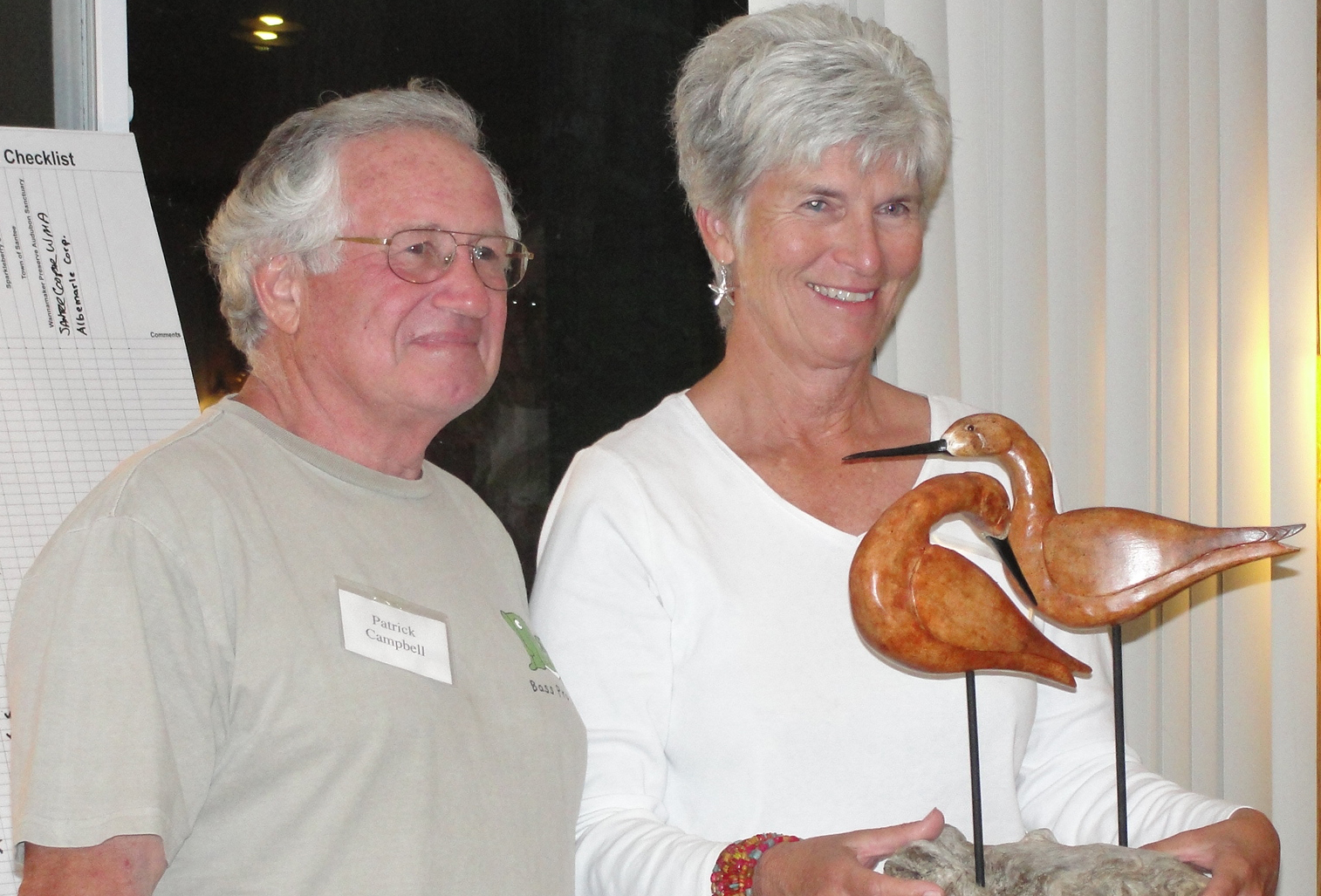
Patrick Campbell, festival attendee and resident of Isle of Palms, donated a shorebird carving to the festival which was raffled off during this event. The carving, an antique-style pair of dowitchers, was carved of basswood and painted with acrylics. The birds are mounted on a piece of driftwood exposed at the Campbell’s lake home in Eutawville a few years ago. Campbell says of his donation to the festival “My contribution was made because I value the festival which highlights our good fortune in South Carolina and I hope that this may become an added attraction for our visitors.” Not until after the festival raised over $200 in ticket sales, the shorebird carving was won by Mrs. Nancy Swan of Mt. Pleasant, SC.
The festival planning committee is donating the proceeds to the South Carolina Nature-Based Tourism Association Richard Mikell Scholarship Fund. This scholarship, which will be awarded later this year, is named for the “Papa Bear” of paddlesports. Kathie Livingston, President of SC Nature-Based Tourism Association and Chair of the South Carolina Paddlesports Industry Association says this of Mikell “His gentle spirit and kind heart led us all. He gave to us by sharing his love for the outdoors, the rivers, the woods, the lakes and he wanted all of us to enjoy it as he did. If ever there was a man for all of us to look up to it was Richard”.
The Santee Birding and Nature Festival planning committee is already thinking about the next year’s festival. This community event is planned by many organizations including; Audubon South Carolina, National Park Service, Santee Cooper Country, South Carolina Department of Natural Resources, South Carolina Nature-Based Tourism Association, U.S. Fish and Wildlife Service, Santee State Park, and Tri-County Regional Chamber of Commerce.
Photo Caption: Carver Patrick Campbell pictured with winner of the carving, Nancy Swan
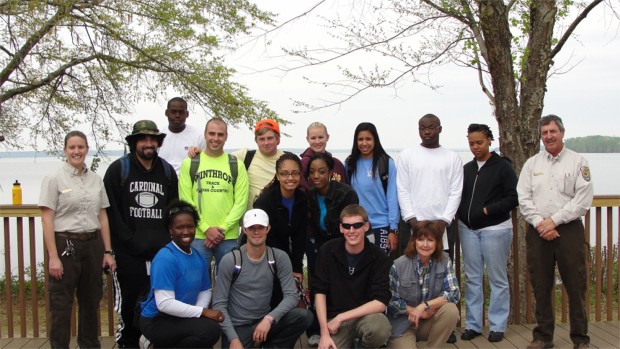
Last month, while most college students were sleeping in on Saturday morning, 15 Winthrop University students arrived at Santee National Wildlife Refuge in Summerton, SC to begin what would be a day filled with learning…and working. Professor of Sociology, Dr. April Gordon, stated “I am hoping to introduce my students to the natural world and an area that I love…and give back at the same time”. The day began with a presentation by Refuge Manager, Marc Epstein. Students learned of the history of the Santee River, the Santee Cooper project that created the lake system, how the refuge was established by Congress in 1941, and many landscape changes that will be influencing wildlife and their habitats in the future.
Next, the students were assigned to a variety of projects that included painting, installing split rail fence, landscaping, and cleaning up the shoreline of the refuge. Although some students were afraid of the wolf spiders and earthworms in the mulch, everyone was in awe at the sighting of a Bald Eagle. “So many things were accomplished today thanks to these students and Dr. Gordon. They jumped right in while listening to the instructions given by staff. It was a great day and a great accomplishment for everyone involved” says Refuge Manager Marc Epstein. “The refuge is hoping this will be a long-lasting relationship with Winthrop University”. These students represent a large segment of our future and the investment with them now will be well worth it years from now.
The Santee National Wildlife Refuge is made up of four units along the northern shore of Lake Marion. Each unit of the refuge provides visitor opportunities for hiking, bicycling, wildlife observation and wildlife photography. For more information about Santee National Wildlife Refuge, call 803-478-2217 or email susan_heisey@fws.gov from Susan Heisey, Park Ranger.
by the U.S. Fish and Wildlife Service Southeast Region!!! March 29, 2011 by Susan Heisey, Park Ranger
Santee National Wildlife Refuge Volunteer Recognized by the Southeast Region
The Santee National Wildlife Refuge is proud to announce that one of their own will be recognized by the Southeast Region of the U.S. Fish and Wildlife Service as a recipient of the 2010 Regional Director’s Award for Volunteer Service. This prestigious volunteer recognition is awarded annually to individuals that demonstrate exemplary work as a volunteer for the Service.
The first time Mr. John “Ed” Sprouse came to the Santee National Wildlife Refuge, Park Ranger, Susan Heisey was impressed. “He said he made 10 bluebird boxes the day before. This is exactly the type of person we are looking for in a volunteer!” Ed single-handedly made over 100 blue bird boxes for the refuge and helped install them on 3 of the refuge units to establish a blue bird nest box monitoring program, and comes to the refuge each week to monitor 25 of the boxes himself. Not stopping there, Helping out wherever needed – mowing, carpentry, sign maintenance…Ed does it all!
Marc Epstein, Refuge Manager, recognized what a superb volunteer Ed was and when the opportunity arose to nominate him for a U.S. Fish and Wildlife Service Regional Director’s Award, there was no hesitation. “Ed does a great job each and every time he comes to the refuge. He has become a part of our refuge family and is very deserving of this recognition”, states Epstein.
The Santee National Wildlife Refuge is extremely proud that Ed Sprouse has been recognized for his service as a volunteer and is so grateful for the work that Ed and all of the volunteers do for the refuge. If you are interested in becoming a refuge volunteer, please contact Susan Heisey at 803-478-2217 or email susan_heisey@fws.gov. National Wildlife Refuges…Where Wildlife Comes Naturally!
December 8, 2010 Santee National Wildlife Refuge will plan to conduct several controlled burns during the coming fall and winter months. The goal of control burning is to enhance wildlife habitat and reduce the risk of wildfires on the Refuge.
The 2010 Annual Control Burn Plan includes 1,060 acres targeted for burning on the Cuddo, Bluff, and Pine Island units. The units involved in the burn plan include fallow fields, upland pine forests, and waterfowl impoundments. Burns are timed so they minimize impacts on wildlife and people and units are burned in small blocks to reduce smoke impacts. The burn plan addresses a wide range of factors such as safety, weather, fuel conditions, smoke impacts and also resources needed to conduct the burns. These burn treatments restore grassland areas, control brush in bottomland hardwood forests, control invasive woody vegetation, and increase the diversity of native plants and wildlife. Other benefits include protection of communities and adjacent landowners by reducing fuels and thus the potential threats of wildfire.
Controlled burns are planned and carried out by trained firefighters operating under strict conditions, known as prescriptions. These plans spell out the number of qualified firefighters, and types and number of equipment that must be present to burn. The weather conditions, including wind speed and direction, humidity, fuel moisture, and other factors described in the plan must be within a prescribed range. If the weather conditions don’t match the prescription, the fire is not started. Smoke from the fires is a concern, and plans call for specific winds to minimize public impact on roads and communities.
Controlled burns are considered a good tool by the U.S. Fish and Wildlife Service for managing wildlife habitat and reducing the risk of serious wildfires. Due to difficulties in predicting weather, the refuge is not able to notify the public of the exact day burns will be conducted. Landowners adjacent to the burn areas and local fire departments are notified prior to igniting the fire. Questions about the controlled burns can be answered by calling the Refuge office at (803) 478-2217.
The mission of the U.S. Fish and Wildlife Service is working with others to conserve, protect and enhance fish, wildlife, plants and their habitats for the continuing benefit of the American people. For more information on our work and the people who make it happen, visit www.fws.gov.
National Wildlife Refuges…Where Wildlife Comes Naturally!
Susan Heisey, Park Ranger, Santee National Wildlife Refuge, 2125 Fort Watson Road
Summerton, SC 29148, office: 803-478-2217, cell: 803-410-2580, fax: 803-478-2314
Visit Your Local Refuge Today! Come celebrate with us and tickle your sense of wonder as you experience the bald eagles, alligators, and great blue herons of Santee National Wildlife Refuge.
Santee National Wildlife Refuge belongs to a nationwide network of federal lands dedicated to the protection of wildlife habitat and wildlife species. The nation’s 552 national wildlife refuges not only protect the nation’s natural resources, but also offer a range of wildlife-dependent recreation.
Santee National Wildlife Refuge was established in 1941 as a migratory bird sanctuary. Located along the northern banks of Lake Marion, the refuge protects 39 miles of shoreline and an abundance of habitat for wildlife. Visitors can observe wildlife from the refuge’s Wildlife Drive or enjoy a scenic view from atop the Santee Indian Mound historic site. Here’s what we have planned to help you celebrate National Wildlife Refuge Week with us:
1. The Big Sit! Bird count on October 10th
2. Mounds and Swampfox: History and Archaeology at Santee – October 13th at 2:00PM
3. Primitive Weapons deer hunt (Pine Island Unit) - October 11 – 16
Oct 10: What is the Big Sit? Some people call it a tailgate party for birders. The Big Sit! is an annual international birding event hosted by Bird Watcher's Digest. This non-competitive, stationary, one-day birding event is great for individuals of all ages and expert and novice birders alike.
Oct 13: U.S. Fish and Wildlife Service Regional Archaeologist, Rick Kanaski, will be giving a presentation entitled “Mounds and Swampfox: History and Archaeology at Santee” on October 13th at 2:00 pm. This program will be a brief synopsis of the area’s history, focusing on the Mississippian period Native Americans, Revolutionary War history, and the 19th century occupation prior to the creation of Lake Marion. Weather permitting, this program will take place at the Santee Indian Mound at the end of Fort Watson Road on October 13th at 2:00 pm. In the case of inclement weather, the program will be moved to the refuge’s Visitor Center.
For more information on these programs and events, please contact the refuge Visitor Center at 803-478-2217 or email susan_heisey@fws.gov.
National Wildlife Refuges across the country will be holding events for National Wildlife Refuge Week. National Wildlife Refuges offer a variety of outdoor activities: fishing, hunting, environmental education, wildlife observation, wildlife photography, and interpretive activities. Many wildlife refuges also offer nature hikes, bird watching tours, wildlife drives and trails, and other adventures. Each year, about 42 million Americans discover the wonders of nature by visiting a wildlife refuge. There is at least one wildlife refuge in every state and one within an hour’s drive of most major cities. For more information about National Wildlife Refuges, visit www.fws.gov/refuges. Susan Heisey, Park Ranger - Santee National Wildlife Refuge
These special hunts encourage adults to share an outdoor experience with kids by bringing a child hunting with them.
Refuge visitors should also note that for the protection of all visitors,
Refuge units that are open to public deer hunts are closed to general public access during designated hunt periods.
Oct 1, 2, 8, 9, 22, & 23, 2010 Lottery Deer Hunts (Bluff Unit), Santee National Wildlife Refuge
Oct 4 - 9, 2010 - Archery Hunt (Cuddo Unit), Santee National Wildlife Refuge
Oct 11 - 16, 2010 - Primitive Weapons Hunt (Pine Island), Santee National Wildlife Refuge
Oct 18 - 23, 2010 - Primitive Weapons Hunt (Cuddo Unit), Santee National Wildlife Refuge
Nov 1 Migratory Bird Sanctuaries Closed, Santee National Wildlife Refuge
Nov 8 - 13, 2010 - Primitive Weapons Hunt (Cuddo Unit), Santee National Wildlife Refuge
"Volunteer a Saturday morning" - June 5, 2010 9 AM. Meet at the Visitors Center.
Some trails have great new signs.
We'd like to clean-up/pick-up along the Refuge road, shore & trails on Bluff Unit.
Bring your gloves & other tools you like.
Be a Friend, bring a Friend.
Summerton, SC… The Friends of Santee National Wildlife Refuge would like to invite you to come and help the refuge clean up the shoreline, Saturday June 5th at 9:00 am. Located along the northern shore of Lake Marion, this winter’s high water levels left behind an abundance of debris and trash littering the scenic and undeveloped shoreline.
Friends, volunteers, and refuge staff will be gathering at the Visitor Center located off of Fort Watson Road at 9:00 am. The trash pickup will focus its efforts on the shoreline between the refuge Visitor Center and the Santee Indian Mound, about one mile of shoreline.
“Donating your time is a wonderful way to give back to the community that you call home.” says Lead Park Ranger, Susan Heisey.
U.S. Fish and Wildlife Service — Region 4, Santee NWR, Southeast Region
Contact: Phil Kloer, (404) 679-7125, philip_kloer@fws.gov
Summerton, S.C. – Secretary of the Interior Ken Salazar announced today the U.S. Fish and Wildlife Service awarded contracts for major wetlands restoration and road repairs at Santee National Wildlife Refuge totaling more than $1.8 million under the American Recovery and Reinvestment Act of 2009 (ARRA).
One contract, for $1,105,742, is awarded to Shaw Environmental and Infrastructure Inc. of Alpharetta, Ga., for repairs to public roads in the refuge. The second contract, for $724,377, is awarded to Ducks Unlimited for improvements to the refuge’s impoundment system that will help it to better manage waterfowl.
“These stimulus-funded improvements will provide needed construction jobs in the area and help boost the region’s economy,” Salazar said. “In addition, the public, including duck hunters, will see the benefits of better roads and better wildlife management.”
Ducks Unlimited is working with refuge staff to design the extensive wetland habitat rehabilitation projects. “This joint venture with Ducks Unlimited brings a second element of wetland management expertise and engineering to the Santee National Wildlife Refuge,” said refuge manager Marc Epstein. “There is a whole community of wildlife that is enhanced when we restore these wetlands.”
When these projects are completed, the refuge will be able to provide improved habitat conditions for numerous species of waterfowl and migratory birds that utilize the refuge as a wintering area, a stop-over point, or as summer nesting grounds. In turn, visitors will have increased opportunities to view these migratory birds undisturbed in their native landscape.
“Ducks Unlimited is happy to work with the U.S. Fish and Wildlife Service on ARRA projects like this one, because it is a win-win-win situation,” said Dr. Scott C. Yaich, Director of Conservation Operations for Ducks Unlimited. “First, these ARRA funds are being used to address priority needs on national wildlife refuges, and studies have also documented that refuges are significant economic generators for local communities across the country. Second, these projects contribute significantly to meeting the conservation needs of waterfowl and many other wildlife species. And finally, this project puts people to work and directly benefits the local economy, just as ARRA intended. As in all Ducks Unlimited projects, our organization is committed to using local workers and companies as much as possible.”
On the refuge’s Cuddo Unit, the 125-acre Timber Island Field waterfowl habitat improvements includes redesigning the interior dikes, constructing 7,419 feet of new dikes, and rehabilitating 6,469 feet of existing perimeter dike. New water control structures will also be installed to enhance water delivery and management to the restored wetland complex. This project will allow impoundments and adjacent reservoirs to be managed more effectively for migratory bird populations. Additionally, a pumping system and engine will be replaced to allow proper drainage of the impoundment complex.
The refuge’s Bluff Unit is the most heavily used waterfowl area on the refuge. This unit consists of three primary wetland impoundments. The ARRA project will create a fourth impoundment and purchase a mobile pump to help service this system. In concert with the DU/ARRA projects, the refuge staff will be improving water delivery and drainage to these systems including installation of a planned six new water control structures. The road improvement projects awarded to Shaw will include repairs on the Cuddo and Pine Island units. The roads, which are badly eroded, will be resurfaced and drainage will be enhanced. These roads are used by hunters during hunting season, as well as by the general public, including bicycles and pedestrian hikers.
The American Recovery and Reinvestment Act passed in 2009 gave $3 billion to the Department of the Interior.
The ARRA funds represent an important component of the President’s plan to jumpstart the economy and put a down payment on addressing long-neglected challenges so the country can thrive in the 21st century. Under ARRA, Interior is making an investment in conserving America’s timeless treasures – our stunning natural landscapes, our monuments to liberty, the icons of our culture and heritage – while helping American families and their communities prosper again. Interior is also focusing on renewable energy projects, the needs of American Indians, employing youth and promoting community service.
“With its investments of Recovery Act funds, the Department of the Interior and its bureaus are putting people to work today to make improvements that will benefit the environment and the region for many years to come,” Salazar said.
Secretary Salazar has pledged unprecedented levels of transparency and accountability in the implementation of the Department’s economic recovery projects. The public will be able to follow the progress of each project on www.recovery.gov and on www.interior.gov/recovery.
Secretary Salazar has appointed a Senior Advisor for Economic Recovery, Chris Henderson, and an Interior Economic Recovery Task Force to work closely with Interior’s Inspector General to ensure the recovery program is meeting the high standards for accountability, responsibility, and transparency set by President Obama.
The mission of the U.S. Fish and Wildlife Service is working with others to conserve, protect and enhance fish, wildlife, plants and their habitats for the continuing benefit of the American people. For questions, comments or concerns email us at recoveryact@fws.gov. For more information on our work and the people who make it happen, visit www.fws.gov.
Summerton, SC….The Santee National Wildlife Refuge is pleased to announce several important habitat management and restoration projects beginning this spring and continuing through the summer months. The American Reinvestment and Recovery Act (ARRA) has provided additional support to Santee NWR to rehabilitate and enhance migratory bird habitat on the Cuddo and the Bluff Unit’s impoundments. The US Fish and Wildlife Service began rehabilitating these systems in 2008 with replacement of antiquated pumping systems, water control structures, clearing water delivery systems, and restoring dikes. With ARRA funding, the refuge will contract Ducks Unlimited (DU) to perform most of the on-the-ground construction. DU is working together with refuge staff to design the extensive wetland habitat rehabilitation projects. Refuge Manager Marc Epstein stated, “This joint venture with Ducks Unlimited brings a second element of wetland management expertise and engineering to the Santee National Wildlife Refuge.”
On the Cuddo Unit, the 125 acre Timber Island Field waterfowl habitat improvements includes redesigning the interior dikes, constructing 7,419 feet of new dikes, and rehabilitating 6,469 feet of existing perimeter dike. New water control structures will also be installed to enhance water delivery and management to the restored wetland complex. This project will allow impoundments and adjacent greentree reservoirs to be managed more effectively for migratory bird populations. Additionally, a pumping system and engine will be replaced to allow proper drainage of the impoundment complex.
The Bluff Unit is the most heavily used waterfowl area on the refuge. This unit consists of 3 primary wetland impoundments. The ARRA project will create a fourth impoundment and purchase a well needed mobile pump to help service this system. In concert with the DU/ARRA projects, the refuge staff will be improving water delivery and drainage to these systems to include installing about 6 new water control structures.
When these two rehabilitation projects are completed, the refuge will be able to provide improved habitat conditions for numerous species of waterfowl and migratory birds that utilize the refuge as a wintering area, a stop-over point, or as summer nesting grounds. In turn, visitors will have increased opportunities to view these migratory bird species, undisturbed, in their native landscape. Additional ARRA projects to start this spring include road repair projects on the Cuddo and Pine Island Unit.
Although not part of ARRA, the U. S. Fish and Wildlife Service is also planning to replace the antiquated water pumping system on the Pine Island Unit this year. Refuge Manager Marc Epstein noted that … “We appreciate the great comments from our community on the recent improvements to the refuge. The Santee NWR has been receiving a lot of attention over the past few years, with upgrading the wildlife drive on the Cuddo Unit, new hiking and kayak trails, observation towers, and the rehabilitated Visitors Center … just to mention a few projects.”
If you have specific questions about these projects or about the Santee National Wildlife Refuge, please contact the Refuge Manager at 803-478-2217 or visit www.fws.gov/santee.
The U. S. Fish and Wildlife Service is the principal Federal agency responsible for conserving, protecting and enhancing fish, wildlife and plants and their habitats for the continuing benefit of the American people. Santee NWR is part of the National Wildlife Refuge System, managed by the Service, which includes more than 150 million acres and 550 national wildlife refuges. The agency oversees the Federal Aid program that distributes hundreds of millions of dollars in excise taxes on fishing and hunting equipment to State fish and wildlife agencies.
Santee National Wildlife Refuge and Santee: 803-478-2217
Event Time Friday, April 23rd Send Adult/Youth Total
(For registration form: www.fws.gov/santee) http://www.fws.gov/santee/pdf/Santee-birding-festival-2010.pdf
7:00 a.m. – 5:00 p.m. Registration - Santee Cultural Arts Center
8:00 a.m. – 12:00 p.m. Santee NWR – Bluff Unit - FREE
12:00 p.m. – 4:30 p.m. Audubon Center at Beidler Forest - FREE
1:00 p.m. – 4:00 p.m. Santee State Park – Fisheagle Swamp Tours $25
1:00 p.m. – 5:00 p.m. Santee Lakes Sampler - FREE
1:00 p.m. – 5:00 p.m. Santee NWR – Bluff Unit; Birding 101 - FREE
1:00 p.m. – 5:00 p.m. Santee NWR - Bluff Unit; Butterflies and Birds Tour - FREE
2:00 p.m. – 4:00 p.m. Santee State Park – SSSSnakes!! - FREE
6:00 p.m. – 8:30 p.m. Keynote Speaker Event & Dinner, Holiday Inn, Santee $25
Saturday, April 24th
7:00 a.m. – 5:00 p.m. Registration - Santee Cultural Arts Center
5:30 a.m. – 11:00 a.m. Manchester State Forest & Poinsett State Park - FREE
7:00 a.m. – 11:30 p.m. Brosnan Forest - FREE
8:00 a.m. – 12:00 p.m. Nature Illustration Workshop - FREE
8:00 a.m. – 12:00 p.m. Santee NWR – Bluff Unit - FREE
8:00 a.m. – 12:00 p.m. Santee NWR – Cuddo Unit - FREE
8:00 a.m. – 12:00 p.m. Sparkleberry Swamp Canoe & Kayak Tour $20 adult/$12 youth (ages 12 and under)
8:00 a.m. – 12:00 p.m. Wannamaker Preserve Audubon Sanctuary - FREE
9:00 a.m. – 12:00 p.m. & 2:00 p.m. – 5:00 p.m.
Wildlife Photography Workshop with Ted Borg (morning – workshop; afternoon – field trip) $10
1:00 p.m. – 3:00 p.m. Santee State Park – SSSSnakes!! - FREE
12:15 p.m. – 3:00 p.m. Giant Cement Quarry Fossil Trip - FREE
1:00 p.m. – 5:00 p.m. Santee NWR – Cuddo Unit; Butterfly Tour - FREE
3:00 p.m. – 5:00 p.m. Santee State Park – Pine Needle Basket Making - FREE
6:00 p.m. – 8:00 p.m. Santee State Park – Birding Countdown - FREE
8:00 p.m. – 9:30 p.m. Santee State Park – Owl Prowl - FREE
Sunday, April 25th
7:00 a.m. – 9:00 a.m. Registration - Santee Cultural Arts Center
5:30 a.m. – 11:00 a.m. Manchester State Forest & Poinsett State Park – FREE
7:00 a.m. – 11:30 a.m. Audubon Center at Beidler Forest – FREE
8:00 a.m. – 12:00 p.m. Santee NWR – Bluff Unit; Birding 101 – FREE
8:00 a.m. – 12:00 p.m. Santee NWR – Bluff Unit; Wetland Plant ID – FREE
8:00 a.m. – 12:00 p.m. Santee State Park – Spring Wildflowers - FREE
8:30 a.m. – 11:30 a.m. Santee State Park – Fisheagle Swamp Tours $25
8:30 a.m. – 12:00 p.m. Congaree National Park - FREE
9:00 a.m. – 12:00 p.m. & 2:00 p.m. – 5:00 p.m.
Wildlife Photography Workshop with Ted Borg (morning – workshop; afternoon – field trip) $10
1:30 p.m. – 3:30 p.m. Congaree National Park Canoe Trip - FREE
Audubon South Carolina
Carolina Bird Club
Friends of Santee National Wildlife Refuge
Holiday Inn—Santee
National Park Service
Nature Adventures Outfitters
Santee Cooper Country
South Carolina Department of Natural Resources
South Carolina State Parks
South Carolina Forestry Commission
Town of Santee
Tri-county Regional Chamber of Commerce
U.S. Fish and Wildlife Service
Santee
The Santee National Wildlife Refuge is proud to announce our participation in the 13th annual Great Backyard Bird Count from February 12th – 15th, 2010. This annual bird count is organized by the National Audubon Society and the Cornell Lab of Ornithology as a way for people of all ages and level of bird-watching experience to participate in observing birds in their backyard, off their balcony, or at their local refuge! Each year, tens of thousands of people throughout the U.S. and Canada take part in the Great Backyard Bird Count. Each checklist will contribute valuable information for conservation, by submitting the data online at www.birdcount.org. The information gathered through this bird count will help scientists understand how the distributions of birds are changing over time.
The refuge will host an early morning bird walk on Saturday February 13th starting at 7:30 am as part of the Great Backyard Bird Count. Refuge staff hopes to observe wintering sandhill cranes as well as snow geese from the trail’s observation tower to add to the count tally. Ducks, geese, and a variety of wintering songbirds may also be seen. Interested participants should meet at the visitor center.
We are also encouraging visitors to the refuge to observe and keep track of all birds seen during the 4-day count period. Individuals interested in participating can pick up a bird check list at the refuge’s visitor center or information kiosk at the Cuddo Unit and start counting. Not only is the count keeping track of different species seen but also numbers of each of those species. Once a person has completed their hike, drive, or bicycle ride around the refuge, they can return their checklist to the refuge visitor center, where staff will compile the sightings of all participants. Individuals must return their checklist to the visitor center no later than February 15th for their count to be included, and if the visitor center is not open when you come by, the refuge will have a box on the front porch for folks to leave their checklists. Please make sure that participant names and contact information is included.
Santee National Wildlife Refuge was established in 1941 as a sanctuary for migratory birds. The refuge encompasses just over 12,400 acres of habitat along the banks of Lake Marion in four separate units. The refuge visitor center as well as the Santee Indian Mound and site of Fort Watson are located on the Bluff Unit, 8 miles south of Summerton on Hwy 15/301.
Santee NWR is one of 550 national wildlife refuges across the country that make up over 150 million acres of land and water for fish and wildlife conservation. The refuge system offers a variety of outdoor activities, including fishing, hunting, environmental education, wildlife observation and photography. Each year, about 40 million Americans discover the wonders of nature by visiting a wildlife refuge. There is at least one wildlife refuge in every state and one within an hour’s drive of most major cities.
For more information about the Great Backyard Bird Count and visitor opportunities at the Santee National Wildlife Refuge, contact Susan Heisey, Park Ranger, at 803-478-2217 or susan_heisey@fws.gov
December 11, 2009.
Santee National Wildlife Refuge Cuddo Unit to Re-Open To Visitors
Summerton, S. C....... Santee National Wildlife Refuge is excited to announce the reopening of the Cuddo Unit
for visitation beginning December 11, 2009. Cuddo has been closed for five months to complete the well
needed Wildlife Drive rehabilitation project. As part of the American Recovery and Reinvestment Act of 2009,
the 7.5 mile Wildlife Drive was completely resurfaced, adding new parking areas and water control structures,
cleaning drainages, and adding numbered trail markers to the Drive. The project was a partnership between the
U.S. Fish and Wildlife Service and the Federal Highway Administration.
A new Wildlife Drive Interpretive Guide will soon be available both at the Cuddo Unit information kiosk and at
the refuge’s Visitor Center. The interpretive guide will direct visitors around the Wildlife Drive loop, having
directional and interpretive information about the area that coincides with the numbered markers. In addition to
the existing 3 miles of hiking trails, new trails have been established including a canoe/kayak trail that will also
be outlined on this interpretive guide.
A wide diversity of habitats can be observed on Cuddo’s Wildlife Drive with open fields, forest, forested
bottomland hardwood wetlands, cypress swamps, and greentree habitats making this area a great place to view
wildlife in their natural surroundings. Alligators, white-tailed deer, and wild turkey are often easily viewed
from the Drive with a segment aptly named “Alligator Alley”. Please remember that feeding wild animals is
illegal and littering is strictly prohibited.
This area is renowned among bird watchers for the diversity of waterbirds and song birds present including
nesting painted bunting during the summer months. Cuddo has been touted as one of the best inland birding
areas east of the Mississippi during the winter months.
The Cuddo Unit of Santee National Wildlife Refuge is the largest of the refuge’s four units, and offers an
abundance of recreational opportunities for individuals who enjoy being outdoors. We encourage checking in at
the refuge’s Visitor Center for the most up-to-date trail information before your visit. Also, the western portion
of Cuddo is closed to all hiking, bicycling, and water access from Nov 1 – Mar 1 each year as a migratory bird
sanctuary area. All points west of the Wildlife Drive will re-open for hiking and bicycling on March 1, 2010.
The Cuddo Unit is open to visitation from 8:00 am – 5:00 pm daily from Oct 1 – Mar 31 and 7:00 am – 7:00 pm
April 1- Sept 30.
Santee National Wildlife Refuge was established in 1941 as a sanctuary for migratory birds. The
refuge encompasses just over 12,400 acres of habitat along the banks of Lake Marion in four separate
units. The refuge visitor center as well as the Santee Indian Mound and site of Fort Watson are located
on the Bluff Unit, 8 miles south of Summerton on Hwy 15/301.
Santee National Wildlife Refuge is one of 550 national wildlife refuges across the country that make
up over 150 million acres of land and water for fish and wildlife conservation. The refuge system also
offers a variety of outdoor activities, including fishing, hunting, environmental education, wildlife
observation and photography. Each year, about 40 million Americans discover the wonders of nature
by visiting a wildlife refuge.
Santee National Wildlife Refuge was established in 1941 as a sanctuary for migratory birds. The refuge encompasses just over 15,000 acres of habitat along the banks of Lake Marion in four separate units. The refuge visitor center as well as the Santee Indian Mound and site of Fort Watson are located on the Bluff Unit, 8 miles south of Summerton on Hwy 15/301.
This year, Refuge Week also focuses on the health of the world’s birds − especially those that depend on refuge lands and waters for nesting, foraging, wintering or rest stops on their migration routes. Last spring a national report by the Department of the Interior credited conservation efforts over the past four decades with saving some species from extinction. The bald eagle and peregrine falcon are among them. However, the “State of the Birds” report noted major population drops for several other bird species, particularly along the coasts, in Hawaii and in the North, where 38 percent of Arctic nesting birds are thought to be in decline. Threats to birds include climate change, loss of habitat and disease.
Meanwhile, the number of Americans enjoying birding as a hobby is on the rise. More than 40 million Americans feed wild birds at home or travel to see them. National Wildlife Refuges − many of which were first established as bird sanctuaries − are finding new ways to encourage and support birding.
“Birds are key indicators of our nation’s environmental health,” says U.S. Fish and Wildlife Service Director Sam Hamilton. “Their ability to survive is a measure of the quality of our air and water, the fertility of our soil, the abundance of our natural resources − factors on which human health also depend. National Wildlife Refuge Week is a perfect time to remember how interdependent all species are.”
Santee NWR is one of 550 national wildlife refuges across the country that make up over 150 million acres of land and water for fish and wildlife conservation. The refuge system also offers a variety of outdoor activities, including fishing, hunting, environmental education, wildlife observation and photography. Many wildlife refuges offer nature hikes, bird watching tours, wildlife drives and trails, and other adventures. Each year, about 40 million Americans discover the wonders of nature by visiting a wildlife refuge. There is at least one wildlife refuge in every state and one within an hour’s drive of most major cities.
There are 550 national wildlife refuges across the country that make up over 150 million acres of land and water for fish and wildlife conservation. The refuge system also offers a variety of outdoor activities, including fishing, hunting, environmental education, wildlife observation and photography. Many wildlife refuges offer nature hikes, bird watching tours, wildlife drives and trails, and other adventures. Each year, about 40 million Americans discover the wonders of nature by visiting a wildlife refuge. There is at least one wildlife refuge in every state and one within an hour’s drive of most major cities.
(Rules for 2010-2011 nearly the same, see schedule at Santee NW Refuge Future Events.)
Santee National Wildlife Refuge announces opening of the refuge for public hunting of white-tailed deer and raccoon during the special seasons listed below. Please note that non-toxic shot is required when hunting with shotguns.
The deer hunt schedule begins with the special Youth Hunt on the Bluff Unit. As announced during May and June, there will not be deer hunting on the Cuddo Unit this year due to extensive road repairs. A week long primitive weapons hunt on Pine Island will start October 5th and end October 10th. Additionally, the Refuge is will be hosting two special quota deer hunts on the Bluff Unit this fall. These special hunts, called “Family, Friends, and Kids” are an effort to encourage adults to share an outdoor experience with kids by bringing a child hunting with them.
Refuge visitors should also note that for the protection of all visitors, Refuge units that are open to public deer hunts are closed to general public access during designated hunt periods.
Four managed hunts for white-tailed deer will be held on the Refuge in 2009 as follows:
Bluff Unit Youth Hunt; Quota Hunt September 25-26, 2009
Pine Island Unit Primitive Weapons Only October 5-10, 2009
Bluff Unit Family, Friends, Kids; Quota October 2-3, 2009
Bluff Unit Family, Friends, Kids; Quota October 16-17, 2009
For the Pine Island hunt, long, recurved, or compound bows and muzzle loading (black powder) rifles only are permitted. All other weapons including handguns and crossbows are prohibited.
For the Bluff Unit Special Hunts, only shotgun slug or muzzle loading black powder rifle are allowed.
For the Special Bluff Unit Hunts, Youth or Family, Friends and Kids Hunts, a completed application form must be returned to Refuge Headquarters by September 15, 2009. These forms and instructions are available on line at: http://www.fws.gov/santee/pdf/09SanteeBluffUnitHuntsInstructions.pdf
or by calling the Refuge Headquarters office at 803-478-2217(Monday through Friday, 8:00 a.m. until 4:30 p.m.) or by written request to Santee NWR, 2125 Fort Watson Road, Summerton, SC 29148.
There is no bag limit for the deer hunts and either sex may be taken. Antlerless deer tags will be furnished by the refuge at each check station. Hunters may legally harvest feral hogs as an incidental take while hunting for deer. Feral hogs are an exotic species and the refuge is allowing this harvest as an effort to minimize potential habitat degradation. All deer and hogs killed on the refuge must be checked at the check station prior to removing the animal from the refuge.
Hunters under age 17 years old are reminded that they must complete a state approved hunter education course before they are allowed to hunt on any National Wildlife Refuge. This requirement applies to all refuge hunts. Evidence of successful completion of such a course will be required. In addition, all youth hunters (under age 16) must be supervised by an adult at least 21 years of age.
To be eligible for Youth Deer hunts, applicants must be at least 10 years and no more than 17 years of age and must possess a valid hunter education certificate. For the Family, Friends, and Kids hunts, eligible youths and adults can hunt. Stands and access will be provided by the Refuge during the Bluff Unit Special Hunts. Please obtain detailed rules and instructions about these hunts from our brochure or the Refuge webpage.
The refuge will also host a raccoon and opossum hunt from 6:00 p.m. on March 1, 2010 through 6:00 a.m. on March 13, 2010. No hunting will be permitted on Sunday, March 7, 2009. Night hunting only is permitted and special State regulations on night hunting apply. Raccoons and opossums may be taken with a shotgun using non-toxic shot size no larger than #4's or a .22 caliber rimfire rifle.
All hunts, except special Youth Only quota hunts on the Bluff Unit, are open to anyone who wishes to participate. A permit is required for all hunts. A free refuge permit allowing participation in all hunts is included on the lower front portion of the hunting regulations brochure. A special refuge permit, signed by the hunter, along with a valid State hunting license, and photo identification (such as a driver’s license) are required and must be in your possession while hunting.
Camping, overnight parking, ATV’s and open fires are not permitted during any of the hunts. Dogs may be used only for raccoon and opossum hunting. Man-drives, stalk hunting and dog drives are prohibited. Special regulations and/or restrictions apply to all refuge hunts.
Scouting on the Pine Island Unit is allowed during periods when it is open to general public access. Hunter access for Pine Island roads will be opened only during each deer hunt and on the Friday and Saturday prior to each hunt to allow hunters to place their stands on the area. Stands may be placed on respective hunt areas on the Friday and Saturday immediately prior to each hunt (from 8 am until 5 pm) and must be removed by 8:30 pm on the last day of each hunt. Weapons and dogs are not allowed during scouting.
Refuge gates for hunting areas will be open from 5:00 am until 8:30 pm during designated hunt periods. All other access (i.e., scouting and stand placement) will be limited to the refuge's normal hours of operation (April - September: 7:00 am until 7:00 pm; October - March: 8:00 am until 5:00 pm).
Hunters are limited to one stand per person regardless of type, including tree stands, ground blinds, and ladder stands. Deer stands on the refuge must be clearly marked with the owner's name and telephone number.
Hunters are reminded that littering is a serious problem on the refuge. Regulations against littering will be enforced.
Since refuge hunting regulations often include changes from years past, hunters are advised to study a copy of current regulations before hunting on the refuge. Any questions regarding permitted activities and all requests for information about hunting, fishing, and other public use programs should be directed to: Santee National Wildlife Refuge, 2125 Fort Watson Road, Summerton, SC 29148. Information may also be obtained by telephoning (803) 478-2217. Hunters may also find information on the Refuge website at: http://www.fws.gov/santee/
ON SANTEE NATIONAL WILDLIFE REFUGE
Summerton, S. C.......The 28th Annual Santee Christmas Bird Count will be conducted on Saturday, December 26, 2009 beginning at 6:30 a.m, meeting at Santee National Wildlife Refuge Visitor Center, located 8 miles south of Summerton on Hwy 15/301. From dawn until dusk, participants will identify and record birds seen and/or heard within the designated count area. Counters will cover the area by vehicle and on foot with special emphasis on several wetland and open water areas, mixed pine and hardwood areas, thickets, hardwood stands, and open fields. The Santee count area includes all four units of the Santee National Wildlife Refuge, Santee State Park, the entire town of Santee, and half of Summerton.
Novice birders and expert birders alike can participate in the count.
To sign up to participate in the Santee Christmas Bird Count, individuals should contact the compiler, Dennis Forsythe, via telephone at 843-795-3996 or email at dennis.forsythe@gmail.com. This year, Dr. Forsythe is especially interested in recruiting folks in the local area who are interested in “feeder watching” in their own backyard during the event.
Birders can look forward to a very enjoyable day in the field and expect to see and hear a variety of bird life. Highlights from previous counts include an average of 130+ species including Le Conte's sparrows, greater white-fronted and Ross's geese, 20+ species of waterfowl, snow geese, tundra swan, Sandhill crane, and eleven bird of prey species including numerous bald eagle sightings and occasional peregrine falcons.
From December 14th, 2009 through January 5th, 2010 tens of thousands of volunteers will be busy identifying and counting bird species as part of the Christmas Bird Count across the country. The data collected through this annual survey is compiled by the National Audubon Society and is used by researchers, scientists, and conservation biologists to assess the long-term health and status of bird species throughout North America. This data was instrumental in the analysis entitled “Audubon’s Birds and Climate Change”, where the Audubon Society was able to site a range shift in migratory bird species over the past 40 years.
Grab your binoculars and your field guide and plan to spend a peaceful day outdoors to wind down after the hectic holiday season. For information on participating and any fees that may be involved, the Audubon Society ask that you visit this website http://www.audubon.org/Bird/cbc/ to learn more about the Christmas Bird Count or contact Dennis Forsythe for details.
Summerton, SC… The Santee National Wildlife Refuge would like to invite you to attend any one of the free events being held on the refuge during the month of November, 2009.
The Santee National Wildlife Refuge is a haven for many species of birds, mammals, reptiles, and amphibians, so why not come out to the refuge and enjoy all that we have to offer and learn about some of our local residents.
• November 14th at 8:00 am - “Birds of the refuge”. Walk through the forested areas along the banks of Lake Marion and observe migratory and resident birds present this time of year. The walk is approximately one mile long and takes you through a forested wetland as well as providing great viewing opportunities into Cantey Bay and the refuge’s Bluff Unit.
• November 19th at 10:00 am, join refuge staff for a trash pick up along Fort Watson Road and the banks of Lake Marion. Last month, with the assistance of 4 volunteers from the local area, refuge staff were able to remove a truckload of trash from the refuge which could be harmful to wildlife.
• November 23rd at 1:00 pm - “Santee’s WILD Visitors”. Learn what animals live on the refuge, how to identify signs of different resident species, and get an up close look at wildlife artifacts.
All activities are free of charge and open to all ages, and will meet at the Santee National Wildlife Refuge Visitor Center and Office at the designated time.
Santee National Wildlife Refuge was established in 1941 as a sanctuary for migratory birds. The refuge encompasses just over 12,400 acres of habitat along the banks of Lake Marion in four separate units. The refuge visitor center as well as the Santee Indian Mound and site of Fort Watson are located on the Bluff Unit, 8 miles south of Summerton on Hwy 15/301.
There are 550 national wildlife refuges across the country that make up over 150 million acres of land and water for fish and wildlife conservation. The refuge system also offers a variety of outdoor activities, including fishing, hunting, environmental education, wildlife observation and photography. Many wildlife refuges offer nature hikes, bird watching tours, wildlife drives and trails, and other adventures. Each year, about 40 million Americans discover the wonders of nature by visiting a wildlife refuge. There is at least one wildlife refuge in every state and one within an hour’s drive of most major cities. For more information about programs at Santee National Wildlife Refuge, contact the refuge office at 803-478-2217 or email Susan_Heisey@fws.gov . Come and be a part of the activities the refuge has to celebrate this annual event.
• Sunday October 11, 2009, the refuge will participate in the Big Sit! birding event at the refuge visitor center. This nationwide event is a great opportunity for new birders and seasoned birders alike.
• Tuesday October 13 at 10:00 am, refuge staff will lead a guided walk along the Wrights Bluff Nature Trail (approximately 1 mile) talking about native flora and fauna.

• Friday and Saturday October 16 and 17 the refuge is hosting the Family, Friends, and Kids hunt on the Bluff Unit of the refuge. Spaces are still available; call the refuge office at 803-478-2217 for information.
• Friday October 16 at 9:00 am the refuge will conclude the refuge week activities with a clean up of the Bluff Unit along Fort Watson Road and the banks of Lake Marion.
Common to the Santee National Wildlife Refuge, refuge staff hope to observe a painted bunting during the Big Sit! birding event at the Visitor Center on Sunday October 11, 2009.
Individuals interested in attending any of these events should contact the refuge office at 803-478-2217 or email Susan_Heisey@fws.gov to register.

|
2nd Santee Birding Festival
April 24-26, 2009 Santee National Wildlife Refuge
803-478-2217 Summerton, SC Santee Cultural Arts Center Santee, SC Click on date for Link to details. REGISTRATION FORMS ONLINE http://www.fws.gov/santee/images/SanteeBirdingNatureFestival.pdf |
Event Times & Fees: Friday, April 24th
7:00 a.m. – 5:00 p.m. Registration - Santee Cultural Arts Center
7:00 a.m. – 2:00 p.m. Santee NWR (Bluff Unit) & Dingle Pond $15
12:00 p.m. – 4:00 p.m. Audubon Center at Beidler Forest Canoe & Kayak Trip $20 adult / $12 child
12:00 p.m. – 4:00 p.m. Audubon Center at Beidler Forest Boardwalk & Trail Tour $10
1:00 p.m. – 4:00 p.m. Fish Eagle Boat Tours $25
1:00 p.m. – 4:00 p.m. Santee NWR Archeology Field Trip $10
1:00 p.m. – 4:30 p.m. Santee Lakes Sampler $10
1:00 p.m. – 5:00 p.m. Santee NWR (Cuddo Unit) $10
1:00 p.m. – 5:00 p.m. Santee NWR (Pine Island Unit) $10
6:00 p.m. – 8:30 p.m. Keynote Speaker Event & Dinner, Holiday Inn, Santee $30
Saturday, April 25th
7:00 a.m. – 5:00 p.m. Registration - Santee Cultural Arts Center
7:00 a.m. – 11:30 a.m. Birding with Pete Dunne – Santee NWR (Cuddo Unit) $65
7:00 a.m. – 11:30 a.m. Santee Swamp Canoe & Kayak Excursion $20 adult/$12 child
7:00 a.m. – 11:30 a.m. Wannamaker Preserve Audubon Sanctuary $10
7:00 a.m. – 3:00 p.m. Audubon Center at Beidler Forest & Brosnan Forest $15
7:00 a.m. – 4:00 p.m. Manchester State Forest & Poinsett State Park $15
8:00 a.m. – 11:30 a.m. Santee NWR - Wildlife Management & Research $5
9:00 a.m. – 4:00 p.m. Wildlife Photography Workshop with Len Rue $75
11:00 a.m. – 12:00 p.m. Commemorative Battle of Fort Watson FREE
1:00 p.m. – 3:30 p.m. The Art of Pishing with Pete Dunne – book & CD included $45
1:00 p.m. – 4:00 p.m. Santee NWR - Kid’s Nature Walk FREE
1:00 p.m. – 5:00 p.m. Santee NWR - Butterfly Walk $10
1:00 p.m. – 5:00 p.m. Giant Cement Quarry Fossil Walk with Rudy Mancke $30
6:00 p.m. – 8:00 p.m. Countdown (Finger Foods provided) FREE
Sunday, April 26th
7:00 a.m. – 9:00 a.m. Registration - Santee Cultural Arts Center
7:00 a.m. – 11:30 a.m. Santee NWR (Bluff Unit) $10
7:00 a.m. – 11:30 a.m. Santee NWR (Cuddo Unit) $10
7:00 a.m. – 11:30 a.m. Santee State Park $10
7:00 a.m. – 12:00 p.m. Congaree National Park FREE
7:00 a.m. – 4:00 p.m. Manchester State Forest & Poinsett State Park $15
8:30 a.m. – 11:30 a.m. Fish Eagle Boat Tours $25
9:00 a.m. – 4:00 p.m. Wildlife Photography Workshop with Len Rue $75
1:30 p.m. – 3:30 p.m. Congaree National Park Canoe & Kayak Trip FREE
Event totals & Participant Name(s), Etc.:
Audubon of South Carolina The Beach Company - Cantey Bay Plantation
Carolina Bird Club Holiday Inn—Santee
National Park Service Nature Adventure Outfitters
Santee Cooper Country Santee Cooper Public Service Authority
South Carolina Department of Natural Resources
South Carolina State Parks South Carolina Forestry Commission
Town of Santee Tricounty Regional Chamber of Commerce
U.S. Fish and Wildlife Service Woodley’s Garden Center
CHRISTMAS BIRD COUNT AT SANTEE NATIONAL WILDLIFE REFUGE
The 27th Annual Santee National Wildlife Refuge Christmas Bird Count was conducted on Saturday, December 27, 2008
Summerton, S. C. Another Great event.
.... The 26th Annual Santee National Wildlife Refuge Christmas Bird Count was conducted on Saturday, December 29, 2007 began at 6:30 a.m. This count was initiated in 1982 to help provide a more accurate census of the numbers and species of birds present during winter months.
Persons interested in joining this year’s count should contact the compiler, Robin Carter via telephone at 803-782-8820 or 803-466-2237 before December 15th. After December 15, please contact Santee National Wildlife Refuge by telephone at 803-478-2217 or email to kay_mccutcheon@fws.gov. Again this year, birding groups for the ten areas censused within this count will be organized prior to the day of the count. Leaders for each of the ten birding groups will contact individual birders assigned to their group to convey information on the group's meeting location and time. A $5 fee helps defer the costs of publishing results in the Christmas Bird Count issue of National Audubon Society Field Notes.
From dawn until dusk, participants will identify and record birds seen and/or heard within the designated count area. Counters will cover the area by vehicle and on foot with special emphasis on several wetland and open water areas, mixed pine and hardwood areas, thickets, hardwood stands, and open fields. Birders can look forward to a very enjoyable day in the field and expect to see and hear a variety of bird life. The Santee count is one of the most popular and productive counts in the State and normally attracts more than 35 participants.
Highlights from previous counts include an average of 130+ species including Le Conte's sparrows, greater white-fronted and Ross' geese, 20+ species of waterfowl, snow geese, tundra swan, Sandhill crane, and eleven bird of prey species including numerous bald eagle sightings and occasional peregrine falcons.
Grab your binoculars and your field guide and plan to spend a peaceful day outdoors to wind down after those hectic holidays. If you can’t join us for the count, you can still participate as a “feeder watcher” by counting birds that come to your yard and your feeders. Check out this website,
http://www.birds.cornell.edu/pfw/ or contact Robin Carter for details. (From Kay W. McCutcheon)
| Thanks so much!!!! We enjoyed today very much....Josh
makes the tour so very interesting....... On Saturday, June 16, 2007, a group of about 25 people showed up at the Bluff Unit to see a variety of birds. With the diverse habitat that the Bluff Unit has to offer, the promise of good birds is always present. The group saw and heard birds such as Painted Buntings and Blue Grosbeaks, along with Yellow-billed Cuckoos and Orchard Orioles. We were also treated with fly-over views of a Mississippi Kite and White Ibis. Along with the birds that were seen and heard, the group saw insects from the Regal Darner, a rather large dragonfly, to a very large number of Mayflies. Paw Paw trees were seen fruiting and Blackberries were fruiting all along the Bluff trail. The flowering plants were not to be outdone, as Trumpet Vine displayed some of the best shades of red. Swamp Rose Mallow, also known as Marsh Mallow, was the flower that seemed to be the focus of most attention. If you missed this nature walk, you missed a good one. As we wound down the walk, members of the group had an informal question and answer session with Josh. We also bid a fond farewell to Lauren Billodeaux, who is leaving Santee NWR to work at Mississippi Sandhill Crane NWR. We wish her the best. To those who came, we thank you for your participation and hope you observed something that will peak your interest in nature and Santee NWR! To those who missed it, we hope you can make the next event at the refuge! This was a fine walk: Birding and Nature Walk on June 16, 2007 with Josh Arrants 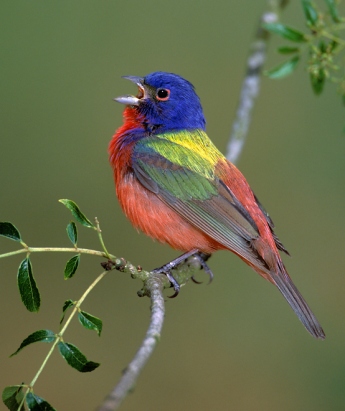
At Santee National Wildlife Refuge The public is invited to join the refuge staff and Friends of Santee National Wildlife Refuge for a birding and nature walk with local naturalist Josh Arrants. Josh will lead a guided bird walk leaving from the Wrights' Bluff Nature Trail parking area at 8:30 AM. A combination driving and walking tour on the Bluff Unit will provide participants with an opportunity to see and hear a number of delightful songbirds including the very colorful Painted Bunting. Other songbirds we can expect to encounter include: orchard orioles, common yellow-throats, blue grosbeaks, northern parulas, indigo buntings, summer tanagers, yellow-billed cuckoos, osprey, and red-tailed and red-shouldered hawks. Sightings of nearly 300 bird species have been recorded on Santee National Wildlife Refuge, making it one of the best inland bird watching areas in South Carolina. Bring your binoculars and fields guides for a great day of bird watching. Call the refuge office at 803-478-2217 for information or to sign up for the walk. You may also email Park Ranger Kay McCutcheon (kay_mccutcheon@fws.gov) with participant information (name, # in party, telephone number). Pre-registration is not required, but the refuge staff would like to have an estimate of the number of attendees. Call Santee National Wildlife Refuge at 803-478-2217 for more information or to learn about wildlife observation and public use opportunities on the refuge. National Wildlife Refuges protect some of our nation’s most unique, spectacular and truly wild places. Learn more about your National Wildlife Refuge System by visiting one of the eight refuges found in South Carolina. Follow the links from http://refuges.fws.gov to find information on your favorite refuge destination. |
| (No longer a problem.) Low
Water Levels Present Challenges and Opportunities for Santee National Wildlife Refuge, from Kay McCutcheon 11-14-2007 Summerton, S. C.....Is Lake Marion half empty or half full? Like so many things, it all depends on your perspective. Sustained drought conditions throughout the Southeast are affecting residents from Georgia to North Carolina and have also resulted in water levels well below normal in most of the State's waterways. Normal lake level in Lake Marion for this time of year is 74.9 feet and the current level is below 68.5 feet, more than six feet below normal. The high water mark or "full pool level" for Lake Marion is 76.8 feet above sea level. As bad as we might think it is now, it has been worse. Although most folks use the extended drought that ended in the latter part of 2002 as a prominent benchmark for drought, the lowest recorded Fall water levels in Lake Marion occurred in 1956 when the lake was down to 64.65, more than twelve feet below full pool. A severe drought declaration was made on September 5, 2007 for all counties except Beaufort and Jasper by the South Carolina State Climatology Office. The ongoing drought affects lake levels in two major ways. Dry conditions upstate reduce natural flows into Lake Marion and utility producers upstream do not have water to release into Lakes Marion and Moultrie because they are under the same drought conditions. Significantly reduced inflows into Lake Marion from the Congaree and Wateree rivers, and from the 15,000-square mile watershed that extends into North Carolina, have resulted in levels on both Lakes Marion and Moultrie not seen since the early 1950s. Although localized rain is important, significant rainfall in the upper portion of this drainage that extends into the Blue Ridge Mountains of North Carolina is even more critical to ending the drought. These areas are also under extreme and exceptional drought conditions. Drought conditions present both challenges and opportunities for natural resource management on Santee National Wildlife Refuge. On the one hand, current water levels are too low to allow refuge staff to pump water from the lake into refuge impoundments managed as feeding and resting sanctuaries for wintering migratory waterfowl. Reasonable rainfall accumulations in the next several weeks will allow us to maintain shallow marshes and impoundments with clay bottoms. It's not so easy to keep water in other impoundments because their sandy bottoms allow the water to seep out. On the other hand, the refuge is trying to make lemonade out of lemons by taking advantage of low water levels to get in areas not normally accessible to mow in several ponds and floodable sites and clear ditches of invasive and overgrown vegetation that block the flow of water. Other projects more easily accomplished during low water include clearing and maintenance of dikes and water control structures and chemical treatment to control invasive and exotic plants. For example, the refuge in partnership with Santee Cooper, was recently able to chemically treat invasive plants (i.e. water hyacinth, alligator weed, cattail, water primrose, white marsh, etc.) in several wetland sites on the Pine Island, Cuddo and Bluff units. We are taking advantage of all opportunities as they become available, including prescribed burning areas that are usually wet this time of year. Other positive impacts of lowered water levels and exposed mud flats are increased use by shorebirds like yellowlegs and sandpipers. The low water and shallow pools also provide a mecca for great blue herons, egrets and other wading birds. During the summer, as many as 130 endangered wood storks were often spotted on the refuge. An abundance of freshwater mussels along exposed shorelines have also provided a veritable feast for raccoons, opossums, alligators, and other wildlife. A recurring history of drought periods is part of the natural hydrology cycle. Wetlands depend on fluctuations to enable them to periodically dry out. It is not healthy for most areas to artificially remain wet all the time and they need seasonal fluctuations. Although prolonged dry periods have severe immediate impacts, these droughts do serve a function in the overall ecology of the landscape. When the hydrology of Lake Marion cycles to dry, sediments in the bottom of the lake and nearby wetlands are allowed to rejuvenate. When the bottoms dry out, the soft organic muck materials break down and the firmer surface is better suited for rooting of new plants. Seeds that have been inundated with water are now able to germinate, grow and complete their life cycle. Nutrients once confined to organic muck are now available to plants growing on newly formed land. The prolific sprouting of vegetation in these dry bottoms is a good thing for the lake and the migratory birds that will later use these areas when the water returns. Seed banks in these exposed areas sprout even more new vegetation when flooded. These food sources will be extremely valuable to migratory ducks and geese wintering on the refuge. The cycle is one of rejuvenation, something that plants and animals are adapted to. However, the reality is that ducks and geese will soon arrive in this area looking for food and sanctuary to get them through the winter before they begin their journeys back to nesting grounds in the North and the number of acres of flooded foraging habitat available on Santee National Wildlife Refuge will be significantly reduced. Another factor that influences waterfowl migration is the weather conditions in northern states. Mild winters don’t push ducks south into the state and we may expect fewer ducks if mild conditions linger into the winter. But, some ducks and geese will invariably migrate and winter in South Carolina. Where will they go? Most likely, waterfowl will be attracted to nearby existing water areas (i.e., farm ponds and shallow areas of the lake). We may witness a phenomenon seen in many other states but not in South Carolina where ducks, geese, and swans use dry agricultural areas for feeding sites. On the refuge, a number of wetlands still holding a few inches of water will be available to a variety of puddle ducks (Northern pintails, American widgeon, mallard, green-winged teal, wood duck, etc.). There are also the designated waterfowl sanctuary areas in Cantey Bay, Pine Island and the Cuddo Unit, where preferred shallow water conditions persist. We are already seeing ducks use these areas. Diving ducks such as ring-necked ducks, scaups, canvasbacks, and redheads could possibly have fewer options on the refuge and may be attracted to deeper water areas within the refuge and on the lake. Refuge staff expect that duck and geese numbers in areas normally flooded will be reduced from previous years. If sheet water conditions in refuge areas like Cantey Bay and Savannah Branch can be maintained, it is entirely feasible that large numbers of waterfowl can find sanctuary in these areas. The refuge still plans to continue our post season migratory bird banding operations in February if the number of waterfowl using the area is stable and water levels are sufficient. |
|
CELEBRATE SPRING AND MIGRATORY BIRD DAY AT SANTEE NATIONAL WILDLIFE REFUGE
Saturday,
May 19, 2007
Wish you were here. 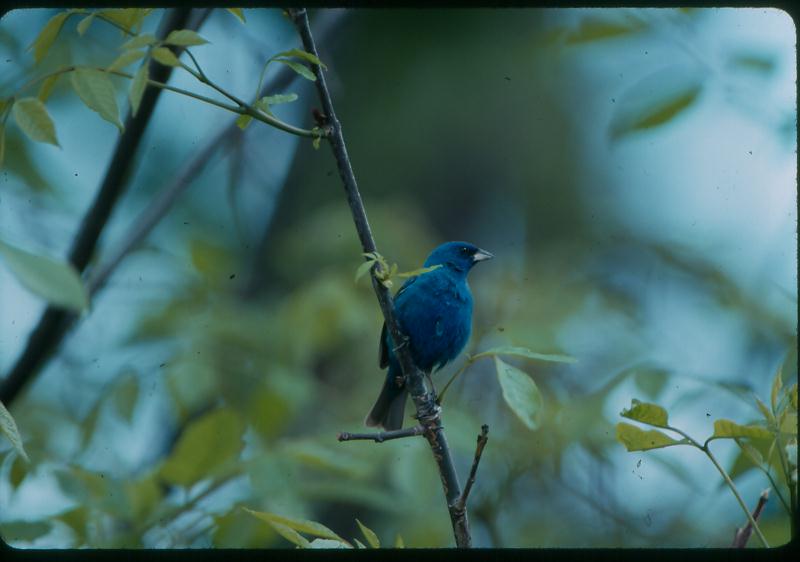
We saw Painted Buntings, the Cedar Waxwings, an eagle, many others & heard so many. Jim presented Ann with his wonderful blue bird box. Thank you Ann and Jim. The public is invited to join naturalist Ann Shahid for birding tour of the Cuddo Unit of Santee National Wildlife Refuge. Ann is Education Director at the National Audubon Society's Sanctuary at Beidler Forest near Harleyville, SC. She is also the South Carolina Coordinator of Audubon's Important Bird Areas and a longtime Audubon member who has led numerous bird outings and conducted bird counts all over the state. According to Refuge Park Ranger Kay McCutcheon, "spring bird migration is in full swing and we fully expect to see lots of interesting birds, including the spectacular painted bunting". Recent bird outings on therefuge resulted in sightings of yellow warblers, black and white warblers, American redstarts, common yellow-throats, black throated blue warblers, and ruby throated hummingbirds, just to mention a few. You should also expect to see the regally clad prothonotary warblers and if luck is with the group, maybe even a yellow throated warbler. Birders may also get a look at several water bird species such as great blue and green herons, white ibis, anhinga, great egret and a variety of raptors (osprey, northern harrier, red-shouldered and red-tailed hawks, and perhaps even a bald eagle). Bring your binoculars and fields guides for a great day of bird watching. International Migratory Bird Day is a national event held annually to celebrate Spring and the return of millions of migratory neo-tropical birds to their breeding areas. Scientists have been noting serious declines in the numbers of migratory bird species during the last twenty years. Many research and educational efforts have been launched to help stop declines and increase populations. The two most common reasons cited for migratory bird population declines are the fragmentation of breeding ground habitat in the U. S. and Canada and the loss of wintering habitat in the Caribbean and Central and South America resulting from the extensive cutting of tropical rain forests. Although most of us can’t do anything to stop the wanton destruction of tropical rain forest habitat, we can become involved in other ways to help migratory bird conservation. You can help neo-tropical migratory birds: grounds in North America and their wintering grounds in Mexico, Central, and South America. - Build and maintain a bird feeder or bird house - Create and improve bird habitat near your home - Reduce use of pesticides in yards and gardens - Keep your cats indoors - Drink bird-friendly, shade grown coffee - Modify windows to eliminate bird-window collisions - Join a wildlife preservation group - Donate to a wildlife preservation fund or group - Volunteer at a wildlife refuge or park - Join a refuge support group - Get involved in community land use planning - Attend a bird watching walk - Take a class on migratory birds - Educate ourselves on conservation issues |
Summerton, S. C….The Visitor Center at Santee National Wildlife Refuge will be closed effective April 15, 2007 while renovations are in progress to
repair and improve the exhibit area and refuge offices. Construction is expected to continue for approximately six months until mid-December, 2007.
For safety reasons, the Visitor Center (including the parking area and information kiosk) will be closed to public access during that period.
All other public use facilities on the four refuge units (Bluff, Dingle Pond, Pine Island, and Cuddo) will remain open during the construction
period. A visitor contact station 2/10 mile past the visitor center entrance has maps and brochures available to assist visitors. If you need
assistance in planning your refuge visit, please call the refuge office at 803-478-2217 (Monday - Friday; 8:00 am until 4:30 pm).
Renovations will include replacement of floor surfaces throughout the building and the removal and replacement of vinyl wall covering in many
areas. Improved lighting equipment will be added, the heating and air conditioning systems will be replaced, restrooms will be updated to improve
accessibility, and the entrance ramp and deck areas will be replaced.
Visitors are encouraged to continue to take advantage of numerous opportunities available to enjoy the tremendous wildlife diversity on
Santee National Wildlife Refuge. The seven mile wildlife drive on the Cuddo Unit and hiking trails on all refuge units are great areas to enjoy
wildlife observation and photography. For more information, visit the refuge website at http://www.fws.gov/santee to print a downloadable refuge
tear sheet that provides a map and details on permitted visitor uses and refuge hours of access.
Shake off those winter cobwebs and join local naturalist
and South Carolina Department of Natural Resources Biologist Billy McCord at 12:00 Noon on Saturday, April 14, 2007 for a Butterfly Walk on the Cuddo Unit of Santee National Wildlife Refuge. Jointly sponsored by the Carolina Butterfly Society and the Friends of Santee National Wildlife Refuge, the Butterfly Walk will include a combination of walking and driving along the Cuddo Unit wildlife drive and back roads as we search for native butterflies and other wildlife.
Take exit 102 off I-95 and follow the blue signs to Santee National Wildlife Refuge.
The Visitor Center is approximately one mile west of I-95 and 7 miles south of Summerton. Wear appropriate clothing and comfortable shoes.
Bring binoculars, field guides, water, food, and insect repellent.
Santee National Wildlife Refuge
Friday March 30, 2007
Agenda:
11:00 Introductions & talks by Marc Epstein, Santee NWR Refuge Manager,
Dale Hall, U.S. Fish and Wildlife Service Director, and Larry
Selzer, President of The Conservation Fund announcing the
national “Go Zero” plan to restore native forests in national wildlife
refuges across the nation and remove carbon from the air we breathe
11:50-12:00 noon Tree Planting Ceremony
§ Marc Epstein, Sam Hamilton, Dale Hall, Larry Selzer, John Frampton
§ Students
Santee National Wildlife Refuge invites you to Sweeten your natural experience with a history lesson
Join us for a Celebration of Wildlife and Living History
on Saturday, March 24, 2007 8:30 AM to 8 PM
and on Sunday, March 25, 2007 9 AM to 3 PM
You missed a fun time if you were not here.
Fire Management & Prescribed Burning: Savannah Fire Mgt District
Archery, Casting, River Treasures, Skins and Hides
Mar 24, Saturday:
8:30 - 10 AM Birding/Nature Tour (via wagon & limited walking): Josh Arrants
10:30 - 11:30 AM Alligators: Billy Downer, SCDNR w/live alligator courtesy of Sara Seashole
12:00 - 1:00 PM Casting Techniques & Contest (for kids): Orangeburg National Fish Hatchery
1:30 - 2:30 PM Wildlife Signs & Animal Track Making (for kids) w/ Lauren Billodeaux
Mar 25, Sunday:
9 - 10:30 AM Birding/Nature Tour (via wagon & limited walking): Josh Arrants
11:00 - Noon Birds of Prey/Animal Rescue w/Sara & Sam Seashole (Cross Wildlife Center)
12:30 - 1:30 PM Practical & Medicinal Uses of Native Plants during the Colonial Period w/ Dr. John Logue
2:00 - 3:00 PM Wetlands Explorations (for kids) - w/ Kay McCutcheon
6th Annual Victory at Fort Watson: At the base of Santee Indian Mound
Revolutionary War period demonstrations: Ongoing Both Days: Camp life,
Primitive skills demos, Colonial games, Firestarting, Weaving, Music
Militia displays, 'Hawk throwing, Local Clay, Coil & Pinch Pottery, Cooking,
Saturday Rev. War author Christine Swager 10 AM: The Fort Watson Story
1 PM: Marion & Lee, The Odd Couple
Saturday Noon: DAR/SAR Memorials/Ceremony
Saturday Starting at 6 PM: Lantern History Walks for Time Travelers
Sunday 11 AM: Rev. War author Christine Swager: The Fort Watson Story
Sunday 1 PM: Special Performance by the USAF Heritage Aire Celtic Music Ensemble
Special Addition: Sunday afternoon:
Performance by the USAF Heritage Aire Celtic Music Ensemble
the first British fort taken by General Francis Marion's Patriots,
Help us celebrate the gifts of nature protected by Santee National Wildlife Refuge
so that we can re-discover our connections to the natural world
much as our ancestors did during the American Revolutionary War era.
Santee National Wildlife Refuge and Swamp Fox Murals Trail Society
For questions, contact: Santee NW Refuge: 803-478-2217 or email kay_mccutcheon@fws.gov
An opportunity for you to
walk where Francis Marion did in 1781 with costumed
volunteers and
to view life
on the backcountry frontier of the Santee River
and experience the natural setting and the Wildlife
Expo.
I-95, Exit 102, US 15/301, Summerton, SC.
Sponsored by Santee NW Refuge, Friends of Santee NW Refuge & Swamp Fox Murals Trail Society
To commemorate the 226th anniversary of the Battles of 1781, especially:
First Battle of Fort Watson - Feb. 27, 1781
Battle of Wyboo Swamp - March 6, 1781
Bridges Campaign with Mount Hope Harassment - March 10-28, 1781
Siege and Victory at Fort Watson - April 16-23, 1781
Victory at Fort Motte - May 6, 1781
Both Battles of Fort Watson & Fort Motte were commanded by Marion and Lee.
Feb. 21, 2007 Comprehensive Conservation Plan public meeting at Summerton Culture Center, 5-7 PM
Great lessons with Josh: Feb. 10, 2007 Birding Basics with Josh Arrants & Walk:
Brush Up on Your Birding Skills at Santee National Wildlife Refuge To Prepare for Audubon's Great Backyard Bird Count
The public came to join volunteer naturalist Josh Arrants for a crash course on the "basics of bird watching" at
Santee National Wildlife Refuge on Saturday, February 10, 2007.
Hosted by the Friends of Santee National Wildlife Refuge, this event will kick off at 8:30 a.m. at the Refuge Visitor Center with a short session on
birding how to's and tips, followed by a two hour field trip to the refuge's Pine Island Unit. Participants will be able to test their newly
acquired skills as Josh guides them on a short walking tour to look at birds
and other wildlife on this 1,050 acre unit of Santee National Wildlife Refuge.
You missed a good one if you weren't here today:
The public came to celebrate National Wildlife Refuge Week with a guided nature and birding walk on the Bluff Unit.
Participants departed from the Visitor Center parking area at 9:00 AM on Saturday, October 7, 2006.
The nature walk features a driving and walking tour led by local naturalist and refuge volunteer Josh Arrants and will last for approximately 2-1/2 hours. With a little luck, the group could see a number of fall migrants as they tour the forested wetlands along the Wrights Bluff Nature Trail and continue with a walking/driving trek around the perimeter of the Bluff Unit. Expect to see a number of wading birds and water birds (great blue and green herons, white ibis, anhinga, great egret) along with a number of raptors (osprey, northern harrier, red-shouldered and red-tailed hawks, and perhaps even a bald eagle). Early waterfowl arrivals could include blue-winged teal along with mallards and year-round resident wood ducks. Other fall migrants to look for include golden crowned and ruby crowned kinglets, white-eyed and red-eyed vireos, hermit thrush, and a number of warbler species (yellow-throated warbler, black and white warbler, American redstart, etc.). Bring your binoculars and fields guides for a great day of bird watching.
The annual celebration of National Wildlife Refuge Week honors the National Wildlife Refuge System's pivotal role in offering visitors outdoor recreational opportunities as well as showcasing the conservation and recovery of wildlife species on Refuges across the country.
Fort Watson and Santee Indian Mound. General Francis Marion and Lt. Col. Harry Lee were here in 1781.
Santee National Wildlife Refuge, I-95, Exit 102, US 15/301, North Santee, SC
Celebration of International Migratory Bird Day and Victory at Fort Watson
A great time for you to discover living history
Participate with Re-enactments, Nature Rides/Walks, Period Crafters, History Rides.
Sponsored by Friends of Santee NW Refuge & Swamp Fox Murals Trail Society
"It was a real success. We were able to cover a lot of ground easily and it was fun too.
I saw several birds for the first time ('course, I'm new around these parts)
and we saw about 25 alligators too. Wish you could have seen everything also! Q"
Exploring the Back Roads on the Cuddo Unit of Santee National Wildlife Refuge
Looking for a great way to celebrate Earth Day -
Join local bird watcher Lloyd Moon and Park Ranger Kay McCutcheon for a bicycling tour of the West side of the Cuddo Unit. Pull out your pedal pushers, sneakers, and binoculars and meet us at the entrance to the Wildlife Drive at 9:00 am on Saturday, April 22, 2006.
We plan to take a leisurely tour of several back roads behind the gates on the Cuddo Unit of Santee National Wildlife Refuge. Expect to spend two to two and one half hours exploring the back roads, canals, ponds, fields and forested wetlands in the Timber Island Field, Black Bottom, and 100 Acre Island sections of the Cuddo Unit. Lloyd Moon will be sharing his tips for "birding and bicycling" and help participants find the best places to look for birds on the Cuddo Unit. We hope to spot a number of delightful songbirds including the very colorful painted bunting. A number of other spring migrants may also be in the area including yellow-throated warblers, indigo buntings, orchard orioles, common yellow-throats, blue grosbeaks, northern parulas, and yellow-billed cuckoos. We'll also explore several nice wetland areas that may bring us sightings of a number of interesting wading birds and shorebirds. Bring your binoculars, sun screen, insect repellent and field guides for a great morning of bird watching. Call the refuge office at 803-478-2217 (803-478-2314 Fax) for information and to pre-register.
Follow the "Santee NWR - Cuddo Unit" signs - Saturday, April 22, 2006.
EXPLORE THE MYSTERY OF CAROLINA BAYS WITH DR. RICHARD PORCHER
The public is invited to the Santee National Wildlife Refuge on Sunday, March 19, 2006 for a presentation on
Carolina bays by renowned Botanist Dr. Richard Porcher.
A slide presentation/lecture in the Visitor Center followed by a short field trip to Dingle Pond.
Plan to come to Santee National Wildlife Refuge, I-95, Exit 102, US 15/301. Ranger Kay: 803-478-2217
October 15, 2005 Wildlife Expo & American Revolutionary Living History Encampment
To commemorate the 225th anniversary of the SC Battles of 1780.
"4th Victory at Fort Watson"
Victory at Fort Watson compliments the Sesquicentennial year long events for Clarendon County and commemorates the 225th anniversary for the 1780 autumn campaigns in St. Marks Parish (Clarendon County), which were:
Aug 20-24, 1780: Battle of Great Savannah or Nelson's Ferry
Oct 25, 1780: Battle of Tearcoat
Nov 7, 1780: Confrontation at Richbourg's Mill
Nov 8, 1780: Chase to Ox Swamp
Nov, 1780: Richardson Cemetery & Tarleton
Dec 12-17, 1780: Battle of Half Way Swamp
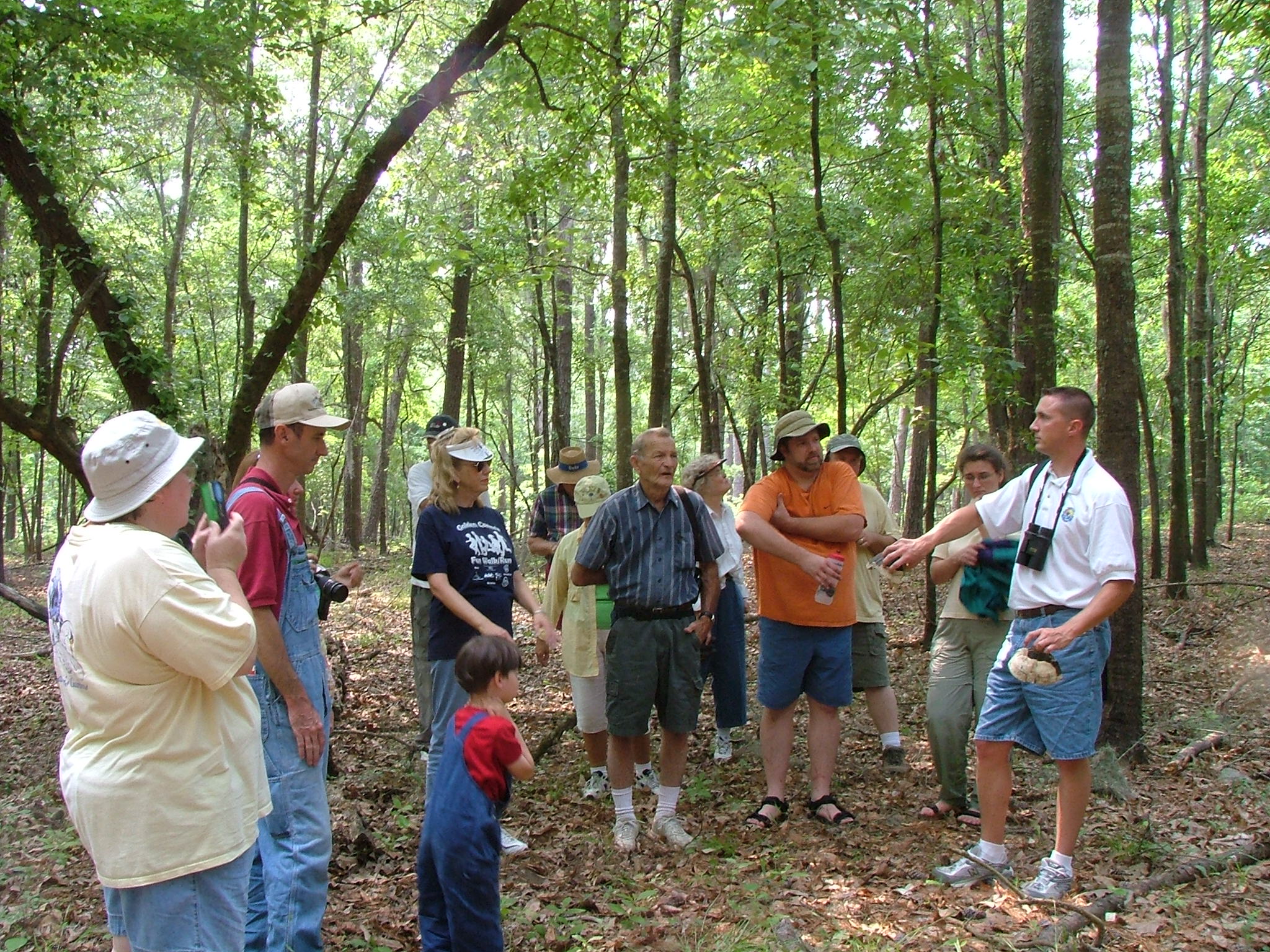
You missed a good one, we saw many beautiful birds, looked at RCW nests, and collected a few ticks (check yourself):
May 14, 2005 Migratory Bird Day Nature/Bird Walk with Josh Arrants
& Canoe Trip to Percanti Island
(Photo from Kay McCutcheon from May 14, 2005)
Start @ Santee National Wildlife Refuge Wrights' Bluff Nature Trail Parking Lot
(follow Ft. Watson Rd. to end past Indian Mound). Call the refuge office: 803-478-2217.
All participants are required to wear life vests during the entire tour.
Bring your own drinking water. ALSO Come if you have your own canoe.
MIGRATORY BIRD DAY CELEBRATION AT
SANTEE NATIONAL WILDLIFE REFUGE INCLUDES BIRD WALK AND CANOE TRIP
Press Release: Summerton, S. C. The public is invited to join the refuge staff and Friends of Santee National Wildlife Refuge for our twelfth annual celebration of International Migratory Bird Day on Saturday, May 14th.
Local naturalist Josh Arrants will lead a guided bird walk leaving from the Wrights' Bluff Nature Trail parking area at 8:30 a.m. The walk features an hour long walking tour of a small portion of the Bluff Unit. Expect to see a number of delightful songbirds including the very colorful Painted Bunting. A number of other Spring migrants have also arrived in the area including yellow-throated warblers, indigo buntings, orchard orioles, common yellow-throats, blue grosbeaks, northern parulas, and yellow-billed cuckoos. Sightings of nearly 300 bird species have been recorded on Santee National Wildlife Refuge, making it one of the best inland bird watching areas in South Carolina. Bring your binoculars and fields guides for a great day of bird watching. No prior registration is required for the bird walk.
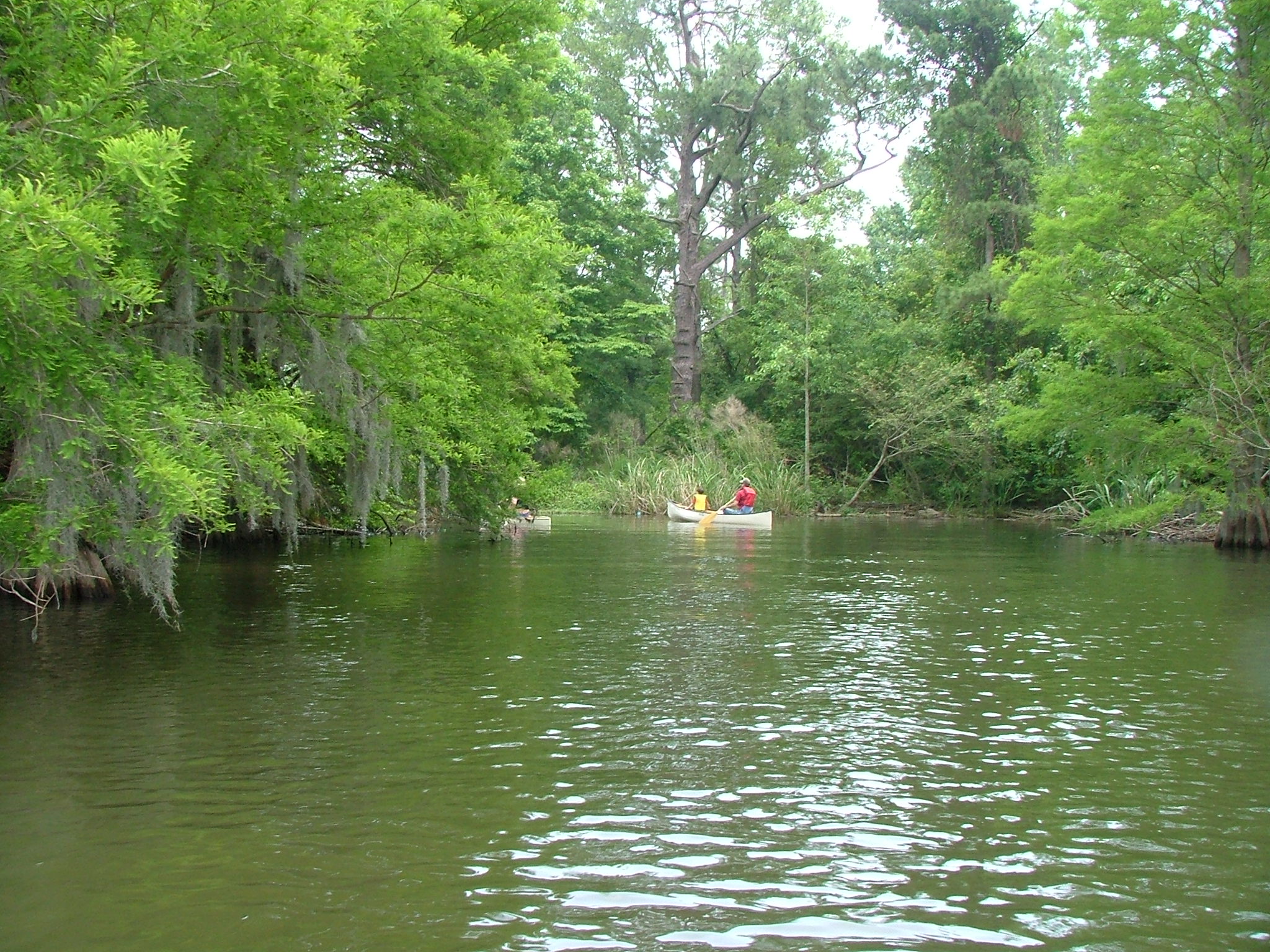
Once arriving on Persanti Island, refuge staff along with naturalist Josh Arrants will take a short hike around the island, and will hopefully be able to spot the elusive red-cockaded woodpecker along with other songbirds. The endangered red-cockaded woodpecker is about the size of the common cardinal or robin, approximately 7 inches long, with a wingspan of about 15 inches.
For more information on International Migratory
Bird Day and ways you can help, visit their website
at http://birds.fws.gov/imbd.birdw
Call Santee National Wildlife
Refuge at 803-478-2217 for more
information on migratory bird conservation
or to learn about wildlife observation
and public use opportunities
on the refuge. We encourage folks to
check out the Friends website at www.santeerefugefriends.org
for more information on the
refuge or to find out
how to join the Friends of Santee National
Wildlife Refuge.
The U.S. Fish and Wildlife Service
is the principal
Federal agency responsible for
conserving, protecting and
enhancing fish, wildlife and
plants and their
habitats for the continuing
benefit of the American people. The
Service manages the 95-million-acre
National Wildlife Refuge
System, which encompasses 544 national
wildlife refuges, thousands of small
wetlands and other special management
areas. It also operates 69 national
fish hatcheries, 63 Fish and Wildlife Management
offices and 81 ecological services
field stations. The agency
enforces federal wildlife
laws, administers the Endangered Species
Act, manages migratory bird populations,
restores nationally significant
fisheries, conserves and restores wildlife
habitat such as
wetlands, and helps foreign
governments with their conservation
efforts. It also oversees
the Federal Assistance program, which
distributes hundreds of
millions of dollars in excise
taxes on fishing and hunting equipment to state
fish and wildlife agencies.
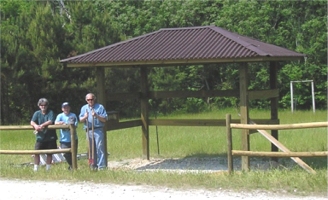
April 23, 2005 for the Earth Day Celebration:
The Red-cockaded Woodpecker and Julie Hovis
Learn about the red-cockaded woodpecker management program at Poinsett Electronic Combat Range, the basic biology of the bird and the overview of the property. Julie will also explain how to monitor the population, the types of management, and the results of the efforts and demonstrate some of the field equipment used to monitor the population (including an elevated camera system) at 10 AM.
Come at 9:30 for a 224th Anniversary Recollection of the Victory at Fort Watson to Santee National Wildlife Refuge Visitor Center.
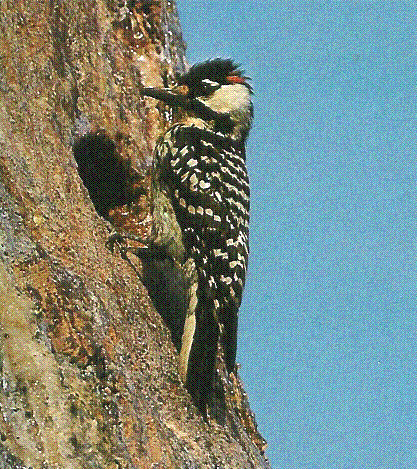
Saturday, Feb 26, 2005 10 AM
RUDY'S COMING! RUDY Was Here!
Friends of Santee National Wildlife Refuge invite you to come too.
Rudy Mancke, long-time host of SCETV Nature Scene and our state's most renowned naturalist, is making a very special visit to the Refuge on Saturday, Feb. 26, for a unique "All About Nature" walk.
Be a Friend and bring along a new Friend.
Meet at the Cuddo Unit Gate at 10:00 AM for Rudy's presentation and a nature walk that you'll never forget. Rudy's walk is about 3 hours, so bring water & snack. Limited to first 40 to sign-up, Friends members have priority. Take this opportunity to renew your Friends of the Santee National Wildlife Refuge membership for 2005.
This is the first of many programs we plan to sponsor this year.
Your support is appreciated. You'll love this Nature Walk.
Visit Santee National Wildlife Refuge, Cuddo Unit, Greenall Rd., Summerton, SC
( I-95, exit 108, turn East. Follow John Land Landing & Cuddo Unit Santee NWR signs.)
Dec 4, 2004 Gary Phillips Birding/Nature walk
Birding Trip w/ Friends of Santee National Wildlife Refuge
9:00 AM Meet at Cuddo gate to Start Walk w/ Gary Phillips
For a 1-1/2 to 2 hour walk/lecture: 803-478-2217
Gary Phillips is a self-proclaimed "bird guy." He has a biology degree from Coastal Carolina, did undergrad research project on birds using a barrier island, also compared foraging behaviors of Brown-headed and White-breasted Nuthatches, have worked on various bird and habitat related projects in coastal SC. He has banding permits for SC and NC, actively engaged in hummingbird study, esp. wintering birds in the Carolinas. He is a member of American Ornithologists' Union, Assoc. of Field Ornithologists, Eastern Bird Banding Assoc. He writes a weekly column about birds and birding for the Myrtle Beach Sun News (5 years now,) He is the north coastal representative for SC Important Bird Areas technical committee, former pres. and board member of Waccamaw Audubon Society. His primary interests are with ecosystems of the coastal plain and their inhabitants and how the landscape influences populations and distributions of organisms. He leads field trips, sometimes rent himself out as a private birding guide, and spends most of his income on birdfood and gasoline.
Sept 18, 2004 Canoe Trip w/ Friends of Santee National Wildlife Refuge
9 AM at Refuge Visitors Center. Ranger-guided canoe trip will be about 3 hours. Friends have canoes, paddles & personal flotation devices available for first 10 to call. All participants will be required to wear life vests during the entire tour. Bring your own drinking water. 803-478-2217
September 18, 2004 11th Annual
National Public Lands Day
Sept
25, 2004 National Hunting & Fishing
Day
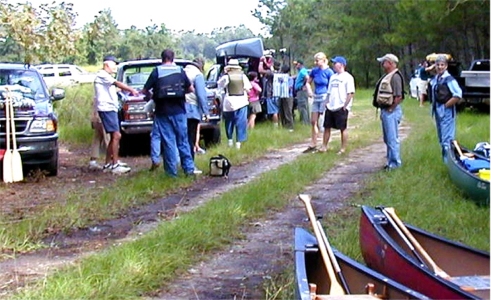
We're getting ready for the canoe trip, all 32 of us, on Sept 18, 2004. |
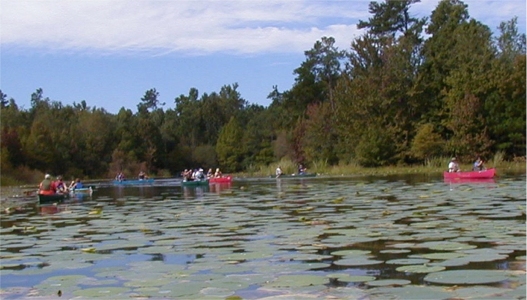
Fine cruising was enjoyed by all in our 13 canoes and a kayak. Thanks Dick for canoes. |
Four area teenagers were selected by random drawing from among thirty-one applicants to serve as Youth Conservation Corps enrollees during 2004. Jay Dukes and Marcus King of Manning High School, Tim Palmer of Scotts Branch High School, and Adam Murray of Dorchester Academy were the four selectees. This group completed eight weeks of work on July 30th and was a huge help to the refuge staff and volunteers. Project completed included: clearing limbs and debris from refuge roads and trails, clearing around a maintenance compound fence at Pine Island, litter pickup on the Bluff Unit and beach area, habitat improvement in upland areas on Pine Island historically favored by the endangered red-cockaded woodpecker, cleaning and checking wood duck nest boxes, and hiking trail clearing and maintenance. Recurring projects completed by the group included mowing of visitor center, shop and public use areas, vehicle and equipment cleanup and maintenance, and weekly wood duck banding assistance. In addition to daily tidbits on ecology and wildlife conservation shared by primary supervisors Bernie Good and Kay McCutcheon, Biologist Bernie Good treated the group to a day long field trip to Beidler Forest and to the SEWEE Environmental Education Center on July 28th. One of the highlights of the summer - enrollee Marcus King overcame his extreme fear of snakes well enough to touch a live snake at Beidler Forest.
Santee
Refuge Receives Funding for Special Projects
It was recently
announced that three project proposals submitted
by Park Ranger Kay McCutcheon to improve visitor
use facilities on Santee Refuge had been approved
for funding. Two projects funded through the
Southeast Regions' Recreation Fee program included replacement
of the Bluff Unit entry sign and various regulatory
signs with signs that provide the public with clear
information on activities permitted or prohibited on
this unit, and design and production of visitor contact stations
at several adjoining public boat landings to include a
refuge map and visitor use regulations. A total of $7,500
has been allocated to the refuge for these two projects.
The other project proposal funded was a $5,000 project submitted to the National Fish and Wildlife Foundation for a Friends Group grant to establish a visitor contact station at the Cuddo Unit entrance along with erection of interpretive signs and numerous other improvements to visitor use areas on this unit. In addition, the refuge also received special funding through the YCC program to replace the wooden boardwalk on the Wrights Bluff Nature Trail.
Anyone willing to volunteer their time and expertise on any of these projects, especially the Cuddo Unit visitor contact station and improvements and replacement of the existing boardwalk should contact Park Ranger Kay McCutcheon for details. (803-478-2217)
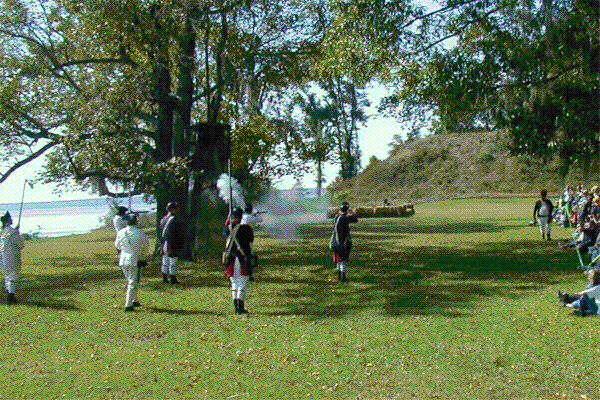
Look what you missed. 2nd 'Victory at Fort Watson' Encampment / Re-enactment / Wildlife Expo October 18-19, 2003 2nd Regt, SC Line Re-enactors & Wildlife Events @ Visitors Center & Indian Mound Santee National Wildlife Refuge I-95, Exit 102, Summerton, SC
|
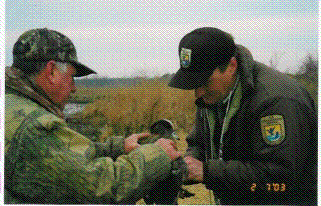
Wildlife Experiences: Banding Birds: Feb, 2003 |

Youth Hunt Experience: Oct, 2003 |
Look what you missed:
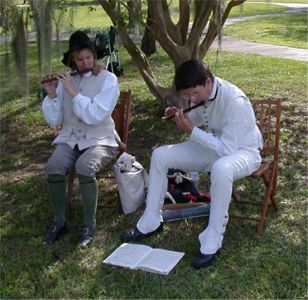
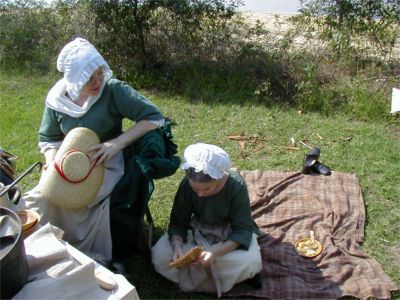
803-478-2217 West of I-95, exit 102 @ US 301/US 15, 6 miles south of Summerton, SC
